£2 fare cap already used for milli0ns of journeys
Government-backed fares initiative has been embraced by more than 130 bus operators and is proving especially popular on some inter-urban routes

Bus users in England have already benefitted from the £2 fare cap to make millions of bus journeys following the launch of the scheme on January 1.
Supported by £60m from the government, all adult, concession and child single tickets on eligible routes will be capped at £2 for three months. This is intended to help with rising living costs and encourage greater use of buses.
On January 6, Britain’s biggest bus operator, Stagecoach, announced that over 300,000 bus users had already taken advantage of the new £2 single fares.
Large numbers have travelled on its popular 700 ‘Coastliner’ service between Portsmouth and Brighton and its 125 service
between Bolton and Preston. Scaled up across all participating operators over two weeks the number of journeys is likely to have exceeded two million. Carla Stockton-Jones, UK managing director of Stagecoach, said: “We are delighted to see that thousands of people are already making the most of this great initiative.”
Not all operators were so keen. More than 130 bus operators are
participating in the initiative, but Diamond Bus, Diamond East Midlands and Diamond South East were not among them. The Rotala-owned companies “would be left considerably out of pocket and would suffer a huge revenue loss if we took part in the scheme”.
Commenting on Twitter last month in a personal capacity, Shane Grindey, former head of marketing at Blackpool Transport, urged bus operators to make the most of the £2 cap.
“I understand the many challenges of the initiative ... But for the first time in a while, an opportunity as an industry to positively position the bus front and centre of people’s minds across national and regional media.”
ISSUE 280 13 JANUARY 2023
NEWS, VIEWS AND ANALYSIS FOR A SECTOR ON THE MOVE
Stagecoach promoting the £2 fare cap
“Thousands of people are already making the most of this great initiative”
East Yorkshire to use big data to aid network Tech will deliver range of benefits 15 GM franchise winners are revealed Go North West wins two major contracts 04 Visit the West Midlands Rishi, but don’t fly Norman Baker urges PM to learn from best 16 Rail continues to flirt with irrelevance Alex Warner fears for inward-looking sector 18 ‘I’ve always loved transport’ Meet Network Rail’s Charlene Wallace 24 INNOVATION & TECH NEWS EXTRA COMMENT PROFILE COMMENT NEWHAPPYYEAR!
Carla Stockton-Jones
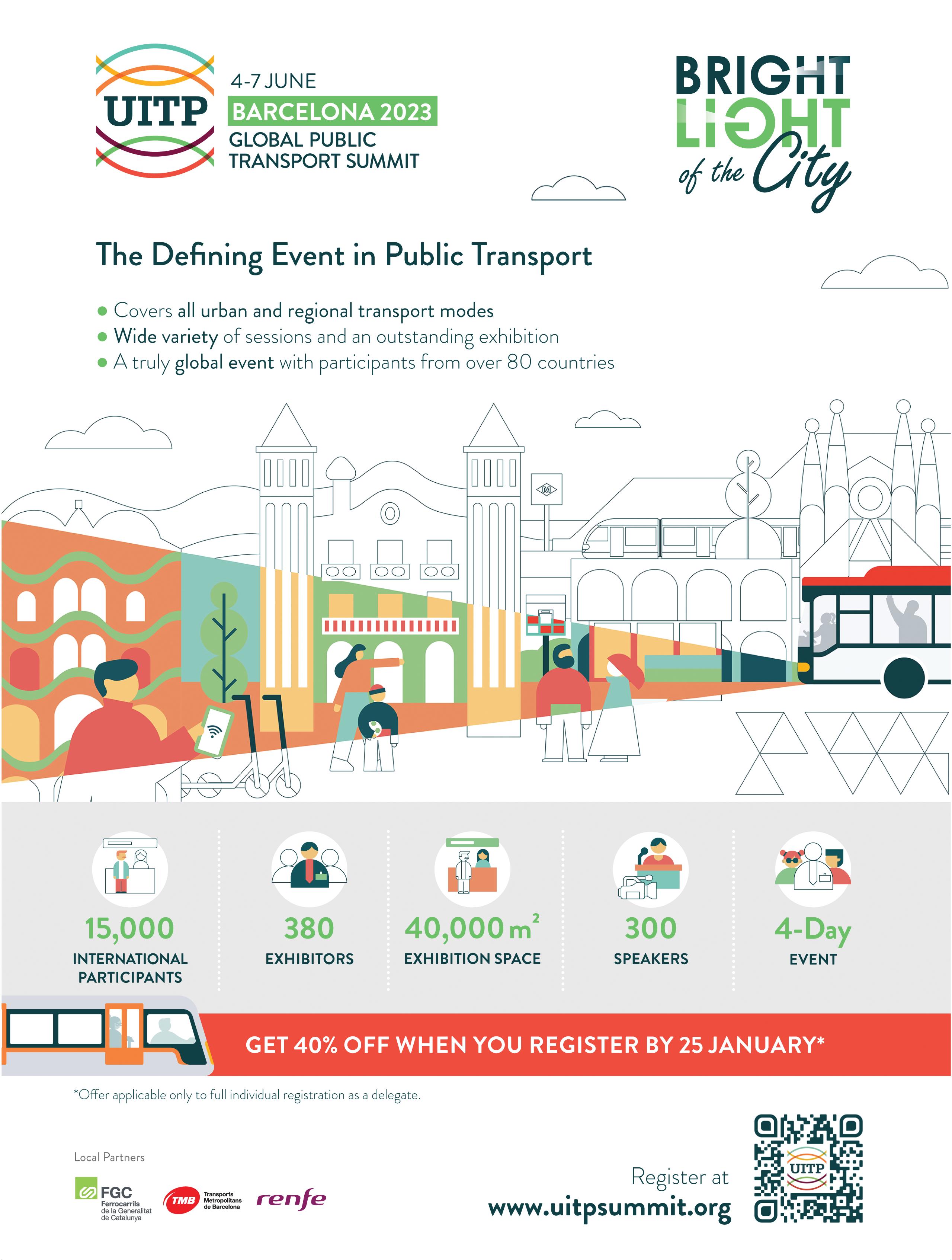
£2 fare cap opportunityis that must be maximised
The biggest ever experiment with bus pricing in the UK has begun. From January 1, 130 participating bus operators across England (outside London) began capping single fares at £2 and with the help of £60m from the Department for Transport this will last for three months. Its implementation has been made possible by the hard work and ingenuity of civil servants and bus bosses. They turned an idea dreamt up in the dying days of Boris Johnson’s time as prime minister into reality.
It isn’t perfect. Not all operators are taking part and some are dissatisfied with the amount of money that they will be reimbursed for taking part. Others perhaps felt obliged to support the initiative in spite of its flaws having received billions of pounds of emergency funding from government during and after the Covid crisis. Some operators could have done more to promote this initiative and maximise the potential it offers to get people thinking about buses. And what happens when it ends and prices leap upwards?
The government could have done more. I may have missed them, but where were the promotional messages on TV, in newspapers or online? Where was the photograph of a senior member of the government boarding a bus with a beaming smile? It’s the least they could do after the ‘avoid public transport’ messaging of the pandemic. Everyone wants to get more people on buses and this initiative has the potential to do that. This opportunity must be maximised.
IN THIS ISSUE
ORGANISATION
27 G RIFFITHS TO STEP DOWN AT STAGECOACH
Stagecoach has announced chief executive Martin Griffiths and chief financial officer Ross Paterson are to step down from their roles in March. Their decision to quit the Perthbased group follows its sale to a private equity company last year.
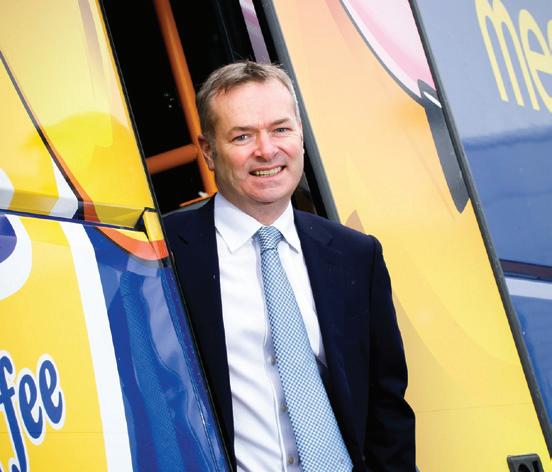
PAGE
Alexander Dennis 4-5
Arriva Midlands 12 Bluestar 7 Cardiff Bus 10 Centrebus 12 CitySwift 15
CPT (UK) 6, 14 East Yorkshire 15 First Leicester 12 First Solent 7 First South 7
Go-Ahead Group 4-5, 12 Go North West 4-5 Go South Coast 7
Great Western Railway 8 Keolis 10 Kinchbus 12
Leicester City Council 12
London Northwestern Railway 8 Newport Transport 10 Northern Rail 8, 10
Nottingham City Transport 14 Porterbrook 8
Rotala 4-5
Scottish Rail Holdings 11 ScotRail 10, 11 Southeastern 10
South Western Railway 14
Stagecoach Group 4-5
Stagecoach South 7
Transdev Blazefield 12
Transport for Greater Manchester 4-5
Transport for London 9
Transport for Wales 8, 10, 15
U-Go Mobility 12
Virgin Trains East Coast 10 Vivarail 8
Yorkshire Coastliner 12
20 A NEW DIRECTION FOR MOBILITY IN CITIES
The way we travel is changing and it has been accelerated by the pandemic. Giles Bailey probes what the statistics are telling us and what does this mean for cities. “The expectation of ‘getting back to normal’ is ill-judged and shortsighted,” he concludes.

22
W HAT FUTURE DOES THE BUS INDUSTRY HAVE?
Recent events have shown that all is far from well in the bus industryhow can we resolve the problems?
Nick Richardson believes inadequate funding is the cause of many problems. “Something needs to change soon to avoid disaster,” he believes.
25
R AIL PROPOSALS COULD REMAIN IN L IMBO
Great Minster Grumbles: Our Whitehall insider imagines what’s going on inside the minds of the mandarins at Great Minster House, home of the DfT.
It seems increasingly likely that plans for reform of Britain’s railways are looking ever more distant.
PASSENGER TRANSPORT PO Box 5496, Westbury BA13 9BX 020 3950 8000 editorial@passengertransport.co.uk CONTENTS www.passengertransport.co.uk 13 January 2023 | 03
REGULARS
NEWS EXTRA 04 NEWS 06 ENVIRONMENT 14 INNOVATION & TECH 15 COMMENT 16 CAREERS 26 DIVERSIONS 28
Jack Managing Editor PASSENGER TRANSPORT editorial@passengertransport.co.uk forename.surname@ passengertransport.co.uk Telephone: 020 3950 8000 Managing Editor & Publisher Robert Jack Deputy Editor Andrew Garnett Contributing Writer Rhodri Clark Directors Chris Cheek, Andrew Garnett, Robert Jack OFFICE CONTACT DETAILS Passenger Transport Publishing Ltd PO Box 5496, Westbury BA13 9BX, UNITED KINGDOM Telephone (all enquiries): 020 3950 8000 EDITORIAL editorial@passengertransport.co.uk ADVERTISING ads@passengertransport.co.uk SUBSCRIPTIONS subs@passengertransport.co.uk ACCOUNTS accounts@passengertransport.co.uk Passenger Transport is only available by subscription. Subscription rates per year; UK £140 (despatch by Royal Mail post); Worldwide (airmail) £280 The editor welcomes written contributions and photographs, which should be sent to the above address. All rights reserved. No part of this publication may be reproduced in whole or in part without the publisher’s written permission. Printed by Cambrian Printers Ltd, The Pensord Group, Tram Road, Pontllanfraith, Blackwood, NP12 2YA © Passenger Transport Publishing Ltd 2023 ISSN 2046-3278 SUBSCRIPTIONS HOTLINE 020 3950 8000 HAVE YOUR SAY Contact us with your news, views and opinion at: editorial@passengertransport.co.uk
Robert
All change as franchise winners are revealed
small contracts. Transport for Greater Manchester (TfGM) has confirmed to Passenger Transport that the final two small contracts will go to Go North West.
The first step towards dismantling deregulation in Greater Manchester took place on December 23 when Andy Burnham, the region’s mayor, announced the winners of the first contracts under the region’s new franchising regime.
Speaking at a special event to reveal the winners, the mayor said locally controlled bus services were fundamental to the Bee Network vision for a better public transport network for all and Manchester was once again blazing a trail. He continued: “Franchising will enable us to better integrate
services as part of a joined-up network, with simpler fares and ticketing, a price cap so no one pays more than they need to, a better customer service offer and a single look for the whole network.”
The contracts relate to socalled ‘Sub-Area A’, covering the north west of the region and includes Wigan, Bolton and parts of Bury and Salford. The new Bee Network in those areas will commence on September 24.
As exclusively revealed in the last issue of Passenger Transport, GoAhead was a big beneficiary of the process with its Go North West business winning the first two large franchise contracts in Wigan and Bolton. Managing director Nigel Featham said he was extremely
Cross-boundary rail and bus service plans
Plans for rail route control as buses face permit system
Transport for Greater Manchester has said it has ambitions for six key rail services to be integrated into the Bee Network once buses are brought under local control from 2025.
They are Wigan - Manchester Victoria; StalybridgeSouthport; Glossop - HadfieldManchester Piccadilly; Rose Hill - Manchester Piccadilly; Buxton - Manchester – Piccadilly; and Alderley Edge - Manchester Piccadilly.
TfGM said the move would see around one in five local train services integrated into the Bee Network, “with a focus on performance and reliability, improved train station accessibility and a pilot of pay-as-you-go fares, similar to Metrolink’s touch-in/ touch-out system”.
“Greater Manchester plans to explore these proposals with the rail industry as part of discussions about longer-term devolution of rail to the city-region, which
proud his company had been chosen to run the first franchises.
“We are absolutely committed to providing the best possible service and can’t wait to get started,” he said. “This new era of public transport will not only represent major change for passengers, but the thousands of people working to provide these vital services.
“While change can be exciting and full of new possibilities, it can also be unsettling and I want to reassure staff working at the depots to be run by Go North West from next September that we will be working hard to ensure a smooth transition.”
Rotala-owned Diamond Bus lost out on both of the large contracts, but it did manage to secure seven

“The procurement process included a restriction that bidders could be awarded a maximum of seven small franchises,” said a spokesperson. “As a result, the two remaining small franchises are being incorporated within one of the large franchise agreements.”
Stagecoach reaction
Stagecoach has expressed disappointment that it has not been awarded any contracts as part of the first tranche of bus franchising. Chief executive Martin Griffiths said the group was “liaising with the combined authority to understand the areas where our bid fell short”.
“We will work collaboratively with the successful bidder for Wigan to ensure a smooth transition for our employees and for the customers who depend on bus services in the area,” he said.
would see larger parts of the network integrated into the Bee Network by the end of the decade,” TfGM added. Meanwhile, TfGM has confirmed to Passenger Transport that commercial cross-boundary bus services will continue after franchising is introduced using a London-style permit system.
A spokesperson said TfGM planned to work with neighbouring authorities and operators to ensure communities remain connected. However, no decision has as yet been made about whether tickets on these services will be incorporated into Bee Network ticketing.
“As a major bus operator with several decades of experience serving communities across Greater Manchester with high quality services, we look forward to participating in other forthcoming franchise competitions.”
However, it appears that no agreement has yet been reached to sell the group’s Wigan depot to TfGM. A Stagecoach spokesperson confirmed to Passenger Transport that discussions over such an arrangement is still ongoing with the Greater Manchester Combined Authority (GMCA). TfGM also refused to be drawn on these negotiations, but it does have a ‘Plan B’ if the talks fail with plans on the drawing board for a new purpose-built 121-bus depot at Martland Park in Wigan (PT274). Planning permission for that scheme is still awaited.
Go-Ahead subsidiary Go North West has been named as the winner of the first two major contracts to franchise bus services in Greater Manchester
NEWS EXTRA FRANCHISING 04 | 13 January 2023 www.passengertransport.co.uk
Andrew Garnett Deputy Editor
Rotala sanguine
Bob Dunn, managing director of Rotala’s Diamond Bus operation in the north west of England, said he was pleased his company had secured seven of the small franchises. “In 2023, in partnership with the Mayor, TfGM and GMCA, we will be stepping up the quality on over 40 bus routes in Greater Manchester, supported by our team of over 250 colleagues and 80 buses,” he said. In an announcement to investors, Rotala went further, revealing the contracts have a combined annual revenue of approximately £18.7m and each are for a period of between three and five years. The AIM-listed group also revealed it had agreed in principle to dispose of its Bolton depot and the majority of the bus fleet to the GMCA.
CPT seeks to influence bus franchising plans
When the sale concludes, the depot and depot assets will be subject to a short lease with nominal rent to support the continued operation of services from the depot until the formal commencement of the Bolton area franchise.
The vehicles will pass into the so-called ‘notional asset pool’ ahead of the start of franchising with the vehicles then allocated by TfGM to the winners of the large and small franchises. These vehicles will then be acquired by the successful bidders at an agreed price.
Rotala revealed it will receive £30.1m in cash as part of these transactions. It added the total unaudited net book value of these assets, at their respective dates of sale, is expected to be approximately £22.7m. Mortgages
and hire purchase on the vehicles involved in the transactions will be repaid with the proceeds but the group adds its contracts for the seven small franchises require it to purchase 67 new buses, all of which will be financed by new hire purchase debt.
The small franchise contracts will be operated from a brand new purpose-built depot in Eccles. Diamond Bus North West already has a small depot there, but Rotala said this did not have the capacity to house around 100 vehicles needed for the new contracts. While the new Eccles depot is constructed, the group said it has secured temporary parking facilities nearby.
Going electric
And speaking of vehicles, Burnham also used the franchise announcement to reveal an order for a further 50 electric buses has been placed by TfGM. It follows an initial order for 50 vehicles to operate as part of the Wigan and Bolton franchises that was
announced in the autumn of 2022 (PT274). The additional buses will enter service in parts of Bury, Rochdale and Oldham when the second tranche of franchising launches there in April 2024.
The buses will be funded from the government’s ‘City Region Sustainable Transport Settlement’ (CRSTS), following Greater Manchester’s award of £1.07bn last year, £438m of which is already ringfenced to improve buses, routes and services.
Hopes for the future
TfGM said while the move to franchising will better enable integrated fares across other modes, bus passengers have been benefitting from new lower fares since September. It added patronage on commercial bus services in Greater Manchester was now also at the highest level since the onset of the pandemic.
With the move to the first franchises now confirmed for September 24, all eyes will be on whether TfGM can deliver.

Page 6
“Franchising will enable us to better integrate services as part of a joined-up network” Andy Burnham
Andy Burnham reveals the first franchise winners
www.passengertransport.co.uk 13 January 2023 | 05
CPT seeks to influence bus franchising plans
Trade body hopes to be a key part of the conversation
FRANCHISING
The Confederation of Passenger Transport published a guide for operators and local transport authorities addressing some of the key issues to consider in moving towards a franchise regime.
Bus franchising was a hot topic during 2022 with Greater Manchester taking its first steps towards putting its regime into practice and Wales consulting on sweeping changes to create a national franchising regime. That’s set to continue in 2023 as other large cities in England, as well as in Scotland and Wales, examine the model.
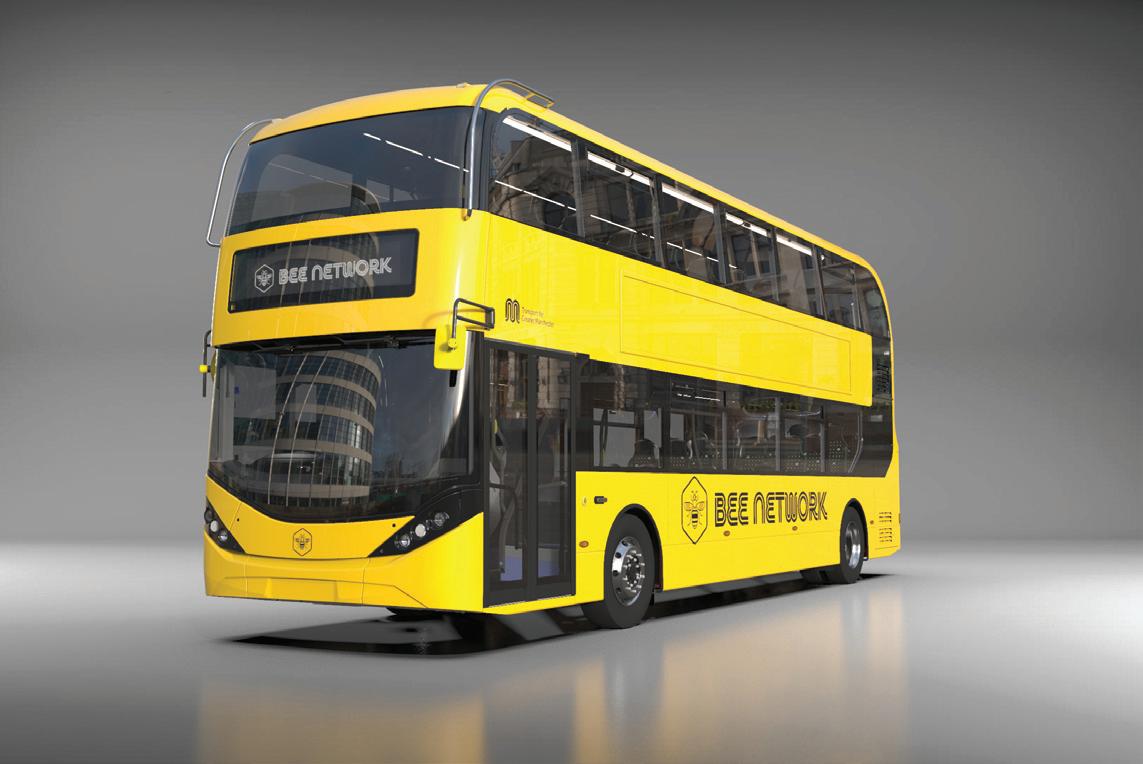
Representing bus operators, CPT spent many years vociferously opposing any attempts to reverse the deregulated model that was introduced in the mid-1980s.
While CPT still believes that partnership working between operators and LTAs is the best way to plan and deliver improvements for passengers, it recognises that franchising is playing a bigger role in the landscape and on behalf of its members wants to engage with those who are considering it.
“Ultimately, our goal is to ensure whatever model is chosen, it delivers the best outcomes for passengers,” explained Josh Miles, director of CPT Cymru.
“That’s why we’ve published a ready reckoner for operators and LTAs on some of the key issues to consider in moving to a franchise regime. The document is a practical approach to franchising and is our contribution to the
discussion and looks to examine some of the tensions that exist in moving towards franchising.
“After all, there isn’t just one way of franchising bus services. Rather, there are a broad range of decisions operators and LTAs can make to bring franchising into being and these decisions often have clear consequences, not least on the operators that are able to take part.”
In the document, one of the main tensions CPT highlights is whether an authority wants to promote stability or competition in bringing in franchising. For instance, an LTA that looks to own the depots and fleets in its area could make a potential franchise more attractive and less risky to operators not currently in their area.
Whilst this would inevitably cost more money upfront, it would bring a more competitive
tender process. However, this could lead to a significant churn in operators in an area with all the challenges that entails. This is a particular concern to SME operators who often struggle in the face of complex and financially demanding tender regimes. After the last few years of flux, stability can have its benefits. Moreover, franchisingparticularly where the LTA takes on the revenue risk - significantly changes the roles shared between operators and LTAs and usually places the risk much more at the LTA’s door. In such an environment, “its critical that an LTA manages the process well and does as much as it can to mitigate risk in the tender process”. Ultimately, a tender process with risk “will lead to higher prices and poorer outcomes for all concerned”, CPT says.
The document suggests ways
that this can be overcome. For instance, starting out with key principles in play, such as clear accountability, trust and collaboration will make for much better control of risk when it comes to contracts. CPT argues that such an environment should put the passenger experience at the heart of the process and work from there.
Similarly, the document maintains that harnessing the benefits of competition and the innovation that operators can bring to the table should be at the top of an LTA’s thinking. Working together can achieve good value for money in a franchise environment.
Once a franchising regime is up and running serious consideration needs to be given to how to keep up improvements in services. Usually, this takes places through a performance management regime. For CPT, a good performance management regime has some clear characteristics. It is simple, it’s focused on things that are measurable and that passengers care about such as reliability and punctuality. It has meaningful incentives to encourage operators to innovate whilst managing the things that they control and significantly, it’s a system that’s clear and fair.
Miles commented: “Such a regime is definitely achievable if LTAs and operators can build trust and collaboration into the DNA of a franchise. And that’s what we hope we can bring to the table. A clear and honest account of the opportunities and challenges of making a franchise work that brings everyone into the same space.
“So as the franchising conversation develops in 2023 in places such as Liverpool, Manchester and Wales we hope CPT can continue to be a key part of the conversation.”
NEWS ROUND-UP 06 | 13 January 2023 www.passengertransport.co.uk
“Ultimately, our goal is to ensure whatever model is chosen, it delivers the best outcomes for passengers”
Bus franchising is coming to Greater Manchester this year
Bluestar mops up First staff in Southampton
Go South Coast successfully recruits 140 CityRed staff
EXPANSION
Poole-based bus operator Go South Coast has announced it has managed to recruit more than 140 new employees ahead of expanding its Bluestar-branded bus network in Southampton.
The Go-Ahead subsidiary launched a recruitment drive last month after First Bus announced its intention to close its bus depot in Southampton and withdraw all of its ‘CityRed’ services from February 19 (PT278).
Explaining the decision to close the business, Simon Goff, managing director of First Bus’s operations in the south and south west of England, said that poor patronage recovery following Covid-19, rising costs, changing travel patterns and a competitive market had led to the decision.
In response, Go South Coast,
EXTRA SERVICES IN PORTSMOUTH
NETWORKS
Stagecoach South is enhancing some routes around Havant and Portsmouth following Portsmouth City Council’s successful bid for funding as part of its Bus Service Improvement Plan.
The move will see extra services in the morning on Routes 21 and 23 with the first trips as early as 4am. The last buses on Friday and Saturday nights will be just after 0100 from the Hard in Portsmouth.
whose Bluestar operation has been a thorn in the side of First’s operations in Southampton for many years, announced plans for significant expansion to fill the void left by First’s withdrawal. It will see the operator add six routes that largely replicate the former
CityRed network. Following the operator’s success in recruiting staff and introducing an expanded network with just 48 hours’ notice following the sudden collapse of Yellow Buses in August 2022 (PT271), Go South Coast has mounted an extensive and
seemingly effective recruitment campaign in Southampton over the Christmas period. Managing director Andrew Wickham said he was delighted by the response from CityRed staff.
“More than 140 new employees have signed up to work with us when we expand our operation in February,” he revealed. “And, with drivers and buses in place, we are ready to take to the roads of Southampton in areas that would otherwise have no service.”
Wickham said the success of the recruitment drive is such that the operator is now in a position to improve frequencies on its planned Bluestar 19 service between Lordshill and Thornhill every 15 minutes on weekdaysrather than every 20 minutes. He added that extra evening journeys will now run on its existing Bluestar 7 route, between Sholing and the city centre.
Small changes have also been made to other journeys on the 21 and 23 to help the buses run on time.
Colin Ashcroft, Stagecoach South’s Portsmouth operations manager, said: “We are pleased to be able to work with Portsmouth City Council on increasing the timetable frequency on services 21 and 23.”
“We are confident the extra journeys and the new £2 flat single fare will make choosing the bus for travel around the city an easy one and hope that residents will take full advantage of the increased service provision and reduced fares.
“These latest changes provide an opportunity to help reduce car
Bluestar’s Southampton network from February 20
usage, making Portsmouth a cleaner and greener place to live.”
Commenting on the expansion, Portmouth councillor Lynne Stagg said: “I am delighted to say that Portsmouth City Council has worked with Stagecoach to offer extended hours on key bus routes in direct response to residents’ feedback.
“These services will be a lifeline to those people working, particularly shifts or unsociable hours, and socialising across the city. These changes are part of a much bigger picture for Portsmouth, offering people the chance to choose public transport, and help reduce the reliance on cars.”
The launch of the new network will mean Go South Coast controls bus networks in both Southampton and Bournemouth. Industry analyst Chris Cheek has urged the operator to “do a Brighton” and create successful, unified networks (PT278).

FIRST EXPANDS SOLENT ROUTE
NETWORKS
First Solent has extended a local bus route in Fareham to serve a major new residential area after securing funding from developers. The extension to Routes 28/28A will be funded by the new North Whiteley Consortium, which is building 3,500 homes as part of the new community. Katie Brandham from developer Taylor Wimpey said extending the bus routes would “add such value to residents”.
Move follows funding from developer consortium
Move follows successful application for funding
www.passengertransport.co.uk 13 January 2023 | 07 Visit the West Mids Rishi, but don’t fly. Page 16
GWR drops plans for EMU conversions
Train operator has abandoned plans to use hybrid Class 769 units on Thames Valley services with battery-electric trials placed on ice
ROLLING STOCK
Great Western Railway has abandoned its plans to deploy former Thameslink Class 319 Electric Multiple Units, dealing another blow to hopes of modified electric trains providing a quick and easy replacement for elderly diesel trains.
In 2016 rolling stock leasing company Porterbrook announced that it would convert some of the units by fitting diesel-powered alternators. The conversion was devised to minimise significant changes to vehicles and keep the cost “to an attractive level”. The first of the units, renumbered as Class 769, were due to enter service with Arriva Northern in spring 2018, followed by units ordered by the Welsh Government in summer 2018.
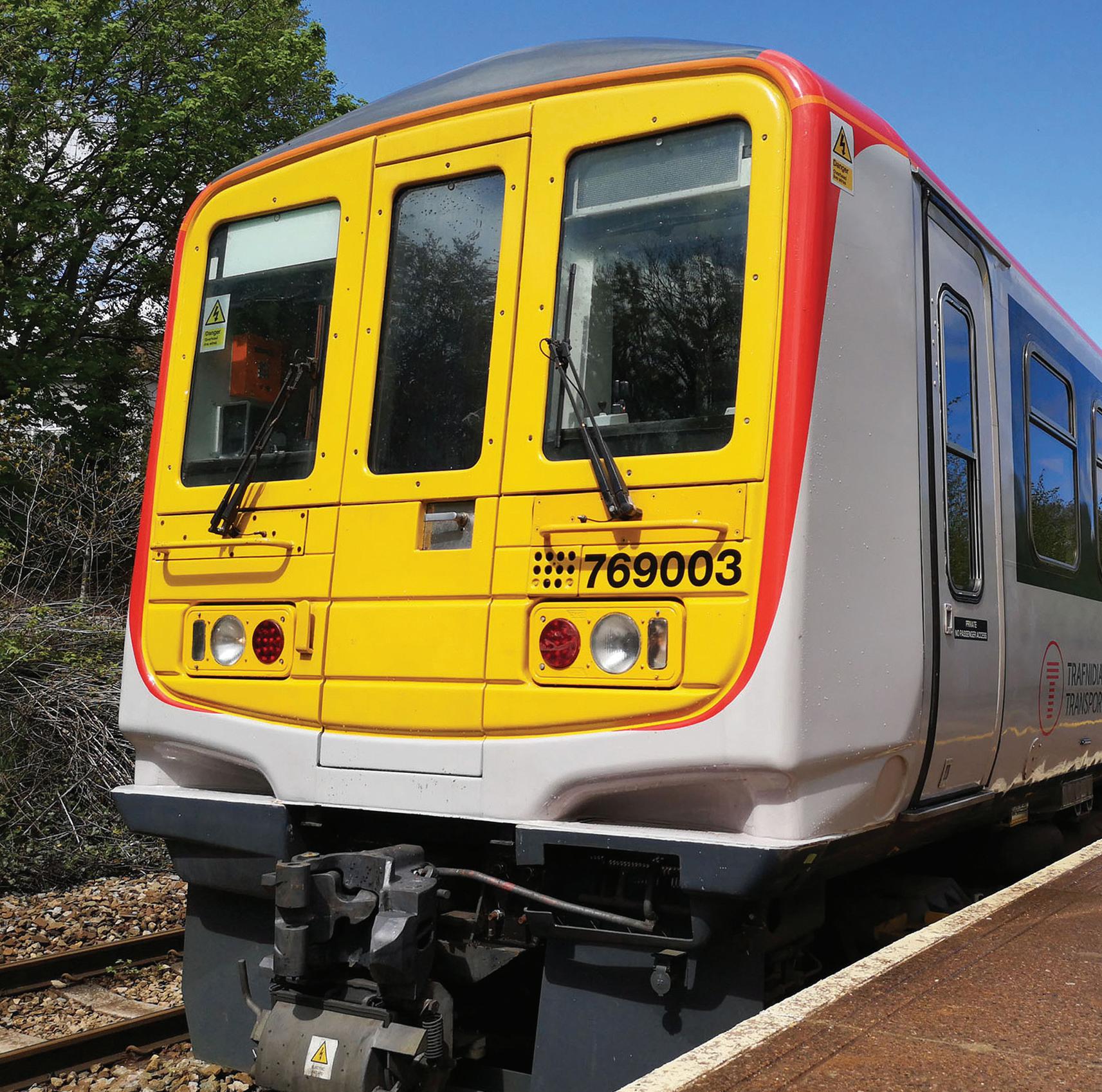
GWR ordered 19 Class 769 units for Thames Valley services. They would have drawn power from overhead or third rail supplies where available, including on the Reading to Gatwick line.
The train operator told Passenger Transport l that it had halted the planned rollout of Class 769 tri-mode trains (diesel/ overhead electric/third rail electric) in the face of revised customer growth figures.
“The 769 programme was developed in anticipation of expected passenger numbers to have grown by around 12% across the network by the close of 2022,” said a GWR spokesman. “However, changes in customer behaviour and demand since the
pandemic means the expected passenger numbers have actually reduced by around 3%.
“We’ll continue to work with partners across the industry to review our fleet provision as we move towards net-zero carbon emissions by 2050.”
Porterbrook’s initiative coincided with Vivarail’s purchase of hundreds of former District Line rolling stock from London
Underground, with a view to converting them for use by various TOCs. Vivarail called in administrators last month, after many setbacks to the introduction of the converted trains.
London Northwestern Railway stopped using its Vivarail units on the BedfordBletchley line because it could no longer guarantee the required level of maintenance would be available. Buses have been operating in place of trains.
Transport for Wales and GWR temporarily halted testing of their Vivarail units.
The Vivarail units on the Isle of Wight continued in operation but have not undergone conversion for diesel or battery power. The
island’s railway was electrified decades ago for earlier types of former London Underground stock.
TfW said it hoped to resume training and testing at the start of this year on the five units it purchased from Vivarail for the Wrexham-Bidston line, but also said there were uncertainties, for example around spare parts. It now aims to have the first units in passenger service sometime in 2023. Their original service entry date was May 2019.
GWR has been trialling a battery Vivarail unit which would be recharged while in daily service on the short Greenford line in West London. The GWR spokesman said: “We continue to work closely with the Department for Transport and industry partners to understand the implications on our fastcharging battery trial, which for now means a pause in testing. We remain committed to delivering this project with our partners on the Greenford branch line.”
TfW was the first operator to bring Class 769s into passenger service, in November 2020. Northern followed shortly after. At both operators, the units have remained prone to failures. TfW has rearranged its planned deployment of new stock this year to enable the earliest possible withdrawal of its nine Class 769s.
The rail industry has a long tradition of refurbishing and repurposing rolling stock. This has included successful installation of new traction packages in EMUs and in diesel locomotives. While the Class 769 appears to have been a conversion too far, other former electric trains are being tested with hydrogen traction packages and Chiltern Railways is trialling retrofitting of diesel units with batteries for use in station areas.
NEWS ROUND-UP 08 | 13 January 2023 www.passengertransport.co.uk
“TfW was the first operator to bring Class 769s into passenger service, in November 2020”
Transport for Wales was the first operator of Class 769s. It is looking to replace them
Minister: ‘Rail reform needs private sector’
RAIL REFORM
Rail minister Huw Merriman has said the government remains “absolutely committed” to reforming Britain’s railways.
Speaking in parliament during a debate on the future of rail services secured by Wimbledon MP and former transport minister Stephen Hammond, Merriman admitted plans for reform had been delayed.
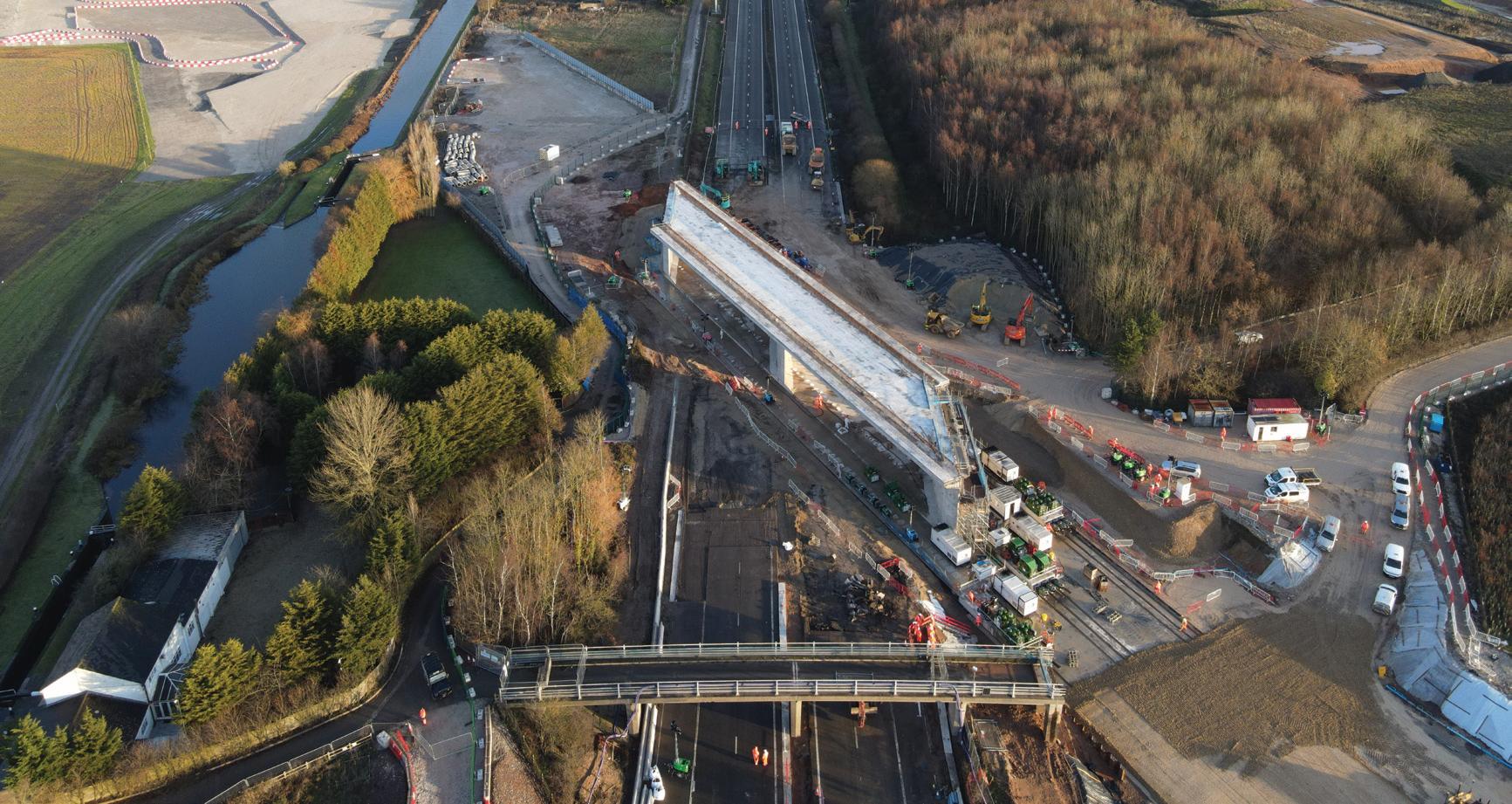
He said the process has been slowed down in order to “to allow more time to test the conclusions and ensure that they were appropriate, given the impact of the pandemic on rail”.
Merriman continued: “There have been various changes of personnel, as my hon. Friend
is well aware. The secretary of state and I have been in post only since the end of October. We are reviewing the options for reform, and we expect to be able to provide concrete proposals as to what the reform will look like very shortly.”
The minister said the government believed the case for reform is stronger than when the Williams-Shapps Plan for Rail was first published in May 2021. Merriman added the lasting consequences of the pandemic, along with industrial relations, sustained poor performance and financial challenges, increase the need for modernisation and efficiency.
“If we want to regrow the railways back to the passenger numbers that we have previously seen, the best way to do that is to wrap in the private sector, which
doubled those numbers post privatisation,” he said.
Merriman went on to say that the creation of a single guiding mind to manage the railways was still only a consideration, but this “would not be nationalisation; rather, it would be simplification”.
“Rail reform must have at its core greater private sector involvement,” the minister added. “I want any new model to take the very best of the private sector: innovation, an unrelenting focus on quality and the type of models that drive reform, a better experience for the passenger and better return for taxpayer value.
But Merriman said the franchising model may have “run its course”. “It was not made easy for the private sector to navigate, because it became a very complex, documented process that put off new entrants.
KHAN FACES FARES DECISION
TICKETING
Fares on Transport for London’s networks are expected to increase by almost 6%, London mayor Sadiq Khan has revealed. He said he wanted to limit the rise to 4% but his hands were tied by the terms of the government funding deal.
Speaking on ITV London News at a special event to mark the 160th anniversary of the opening of the Metropolitan Line, Khan claimed the agreement with ministers forced him to mirror the planned 5.9% rise in national rail fares or cut services.
“If we don’t increase the fares by 5.9%, the government won’t support us,” said the mayor. “The consequence of us not increasing fares by 5.9% is having to make cuts elsewhere. The only reason fares will go up is as a result of the conditions created by the government.
However, the Department for Transport disputed Khan’s claims about the planned fare rise.
“It is for the mayor of London to decide whether TfL fares increase in line with national fares,” said a spokesperson. “We have already provided an unprecedented £6bn of support to TfL since the start of the pandemic and ongoing support must be fair for taxpayers across the country.”
Transport for London increased fares in 2022 by an average of 4.8%.
www.passengertransport.co.uk 13 January 2023 | 09
Merriman says sector needs more private sector involvement
HS2’S WORLD-FIRST ‘BRIDGE SLIDE’ In a huge feat of engineering, HS2 Ltd has delivered the world’s longest box slide to move a 12,600 tonne bridge into place over the M42 in Warwickshire during a 10-day closure of the motorway over the Christmas period. The structure will carry HS2 trains over the motorway towards Crewe and the north.
London mayor claims hands tied by agreement
“If we don’t increase the fares by 5.9%, the government won’t support us” Sadiq Khan
Rail proposals could remain in limbo. Page 25
Welsh support for a bus operator of last resort
OLR would provide continuity of service on a par with the found in the rail sector and the plans have already won support from the general public
REGULATION
There is overwhelming public support in Wales for the creation of a bus Operator of Last Resort (OLR), according to the results of the public consultation on the Welsh Government’s plans for bus reform.
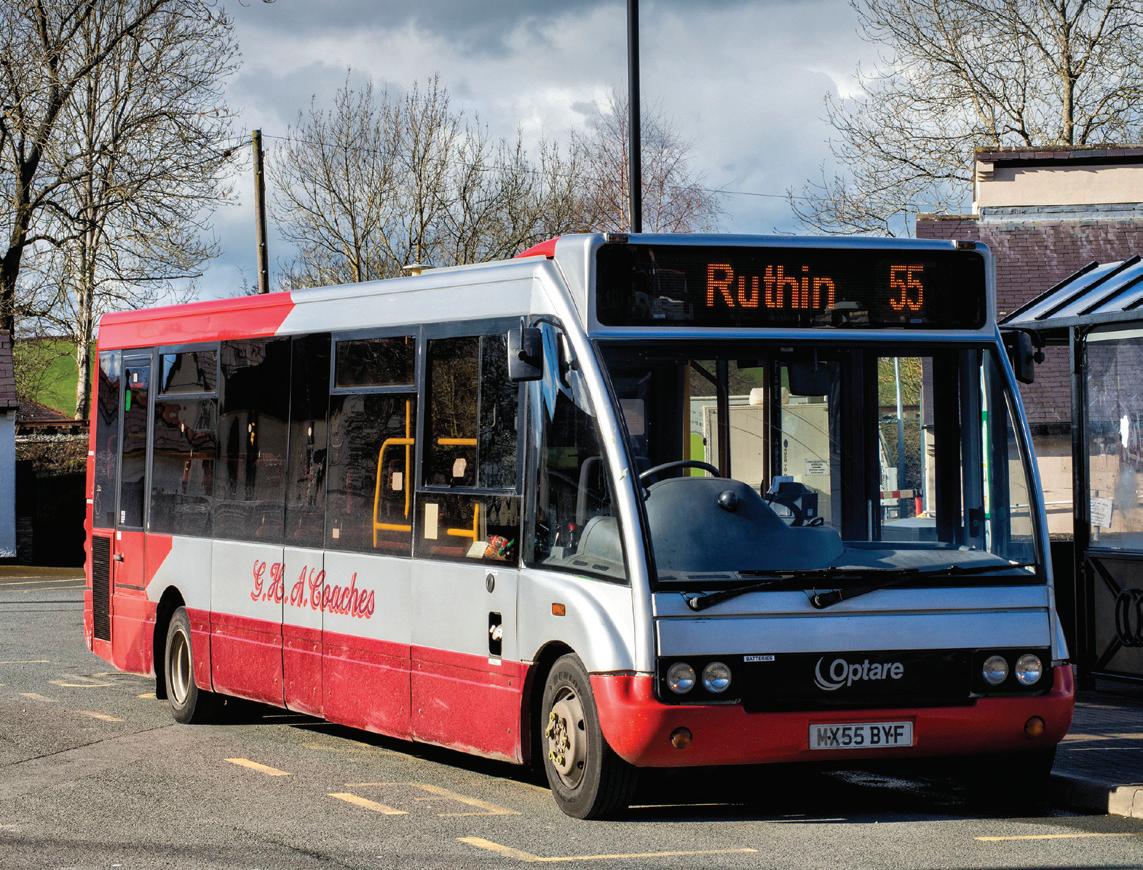
Passengers and local authorities in many areas of Wales have suffered disruption to services in the last decade after independent operators, such as GHA Coaches and Express Motors, closed down. An OLR would be designed to provide continuity in the event of an operator withdrawing.
The government proposes to legislate for franchising to be rolled out in all areas of Wales, without the partnership option which is included in the comparable legislation already enacted for England and Scotland. The consultation ran from March to June but the government did not publish a summary of the results until shortly before Christmas.
The government’s White Paper explained: “Other franchising models, such as in rail, include provisions in case of operator failure to allow an Operator of Last Resort to step in and run services. Even before the crisis of the Covid-19 pandemic this power had been used on multiple occasions to ensure trains kept running after a franchisee in financial difficulties withdrew from a contract.
“We are proposing to create a similar provision, whereby a
public service operator, which might for example be a locally owned municipal operator or Transport for Wales at a national level, could step in should a franchise fail and make sure buses keep running.”
The consultation document asked: “Do you agree with the benefits of establishing a mechanism to allow a public service operator of last resort to ensure services keep running if a franchise fails?” In response, 483 respondents strongly agreed and 148 agreed – together accounting for 90.2% of consultation respondents.
More than 150 respondents
provided comments on the OLR proposal. Some said that having a failsafe was a “critical part of the plan”. Many said that having seen how an OLR can work in rail, it was evident that bus needs the same provision.
TfW Rail Ltd, the Welsh rail OLR, took over operation of Wales & Borders services after Covid-19 effectively brought an end to the franchise TfW awarded to Keolis and Amey in 2018. ScotRail has transferred to the Scottish OLR, and the UK Government’s OLR stepped in after difficulties at Virgin Trains East Coast, Northern and Southeastern.
Only 2.3% of the consultation respondents strongly disagreed with the Welsh bus OLR proposal, and some of them did so because they felt the OLR should be the “provider of first resort”, with the bus system being fully
nationalised.
Supporters of the proposal said it should be made clear that franchisees will not be allowed to “dump routes which can then be picked up and covered by the state”, and that routes should be packaged in ways that are attractive, achievable, monitored and maintained.
Some said thought needs to be given to what would be needed for the OLR to start services immediately if required, such as “whether organisations would be able to have the right scalability and licensing in place, enough staff to cover services, the right fleet and depots or would adhere to existing route plans”.
Only two municipal operators survive in Wales, Newport Transport and Cardiff Bus. The councils which own both companies are concerned that franchising could result in significant loss of territory which would leaving them with significant financial liabilities, such as redundancies, pension costs and writing off assets.
In its response to the consultation, Cardiff Council said further clarification was needed on the OLR. “Although not explicit, the suggestion is that municipal operators could have a role in providing operator of last resort support. Should franchising emerge as the preferred governance model such a provision will be necessary, but the White Paper consultation is unclear about how this would be structured.
“Any failed franchise operator will own or lease its assets including vehicles and depots. The White Paper indicates no powers for the OLR to acquire these assets to conduct operations immediately following a market failure. There are such powers for rail operations.”
NEWS ROUND-UP
“The suggestion is that municipal operators could have a role”
10 |13 January 2023 www.passengertransport.co.uk
GHA Coaches is one
of many company to have collapsed in recent years
What future does the bus industry have? Page 22
Scotland axes plans to cut Covid bus funding
COVID-19
The Scottish Government has dropped plans to scrap emergency bus funding and has revived the previous Network Support Grant Plus (NSG+) scheme.
Scottish operators became the first in the UK to return to normal funding arrangements following the Covid-19 pandemic in early October after NSG+ was wound down. It followed a previous extension of the scheme in the summer of 2022.
The move comes despite Scottish transport minister Jenny Gilruth making it clear to operators in early October that the Scottish Government would not provide any further
temporary financial support. This was despite operators warning that winding down the scheme while bus patronage was still on the doldrums could lead to widespread cuts (PT275).
Before Covid-19 Scottish operators received funding via the Bus Service Operators Grant (BSOG). However, since March 2020,Transport Scotland has administered emergency support through the Covid-19 Support Grant (CSG) and Covid-19 Support Grant - Restart (CSGR), which both ended on March 31, 2022. The Network Support Grant was introduced as a successor to BSOG with NSG+ designed to bridge the gap from the winding down of Covid-19 restrictions to normal operation.
Revised guidance confirms NSG+ will now cease on March
31 , with additional terms and conditions between October 10, 2022 and March 31, 2023.
However, payments are being reduced as part of those changes. Operators will now receive 39.2p per kilometre from October 10, this is down from 50.50p per kilometre offered betweeen August 16 and October 9 and the 79.4p offered until August 15.
Payments to operators from the latest iteration of the NSG+ scheme will be backdated, to October 10 provided it can be demonstrated the terms and conditions of the grant were met over this period.
Operators participating in the scheme will be required to provide a significant amount of data to Transport Scotland.
This includes provision of forecast service kilometres;
regular data on farebox revenue, costs, patronage and other relevant measures; data on drivers shortages, revenue and key costs; a commitment to consult with relevant local transport authorities on timetabling, and, in particular any changes to bus services which may affect travel to education; a cap on permissible fare rises with increases limited to the Consumer Price Index; and a financial reconciliation and a margin sharing agreement.
Operators must also commit to no commercial fare price increases being permitted to be implemented from October 10, 2022 to March 31, 2023 unless this is with the consent of Scottish ministers.
They must also be prepared to share information on transition planning and this must be submitted by the end of this month. This document must demonstrate how operators will ensure commercial sustainability following the end of NSG+ at the end of March.
SCOTLAND
TO AXE PEAK RAIL FARES
Six-month
TICKETING
The Scottish Government has announced peak-time rail fares will be abolished for a six-month trial period from April. The move will be subsidised by £15m from the latest budget.
The move will lead to significant discounts for passengers. For example, a peak-time return ticket between Glasgow and Edinburgh would usually cost around £27.60. However, an off-peak day return ticket for the same journey is significantly cheaper at £14.20.
Deputy first minister John Swinney made the announcement in his
2023/24 budget statement, saying that removing peak time fares was “a way of making rail travel more affordable and attractive to travellers”.
More details regarding the plans for the pilot scheme, alongside wider plans for ScotRail ticketing, will be announced as part of Transport Scotland’s Fair Fares Review to be made public in the coming weeks.
Scrapping off-peak fares has been a long-standing policy of the Scottish Green Party. Ross Greer, the Scottish Greens’ finance spokesperson, said the move would “open up” the country’s railways.
“I am delighted that we have been able to deliver this longstanding Green policy, one which will save rail users a huge amount of money during the cost of living crisis and
which will help Scotland meet its climate ambitions,” he said.
“This builds on the success of the free bus travel scheme which Greens introduced for everyone under 22 earlier this year. It will play a vital role in ensuring that public transport is an affordable, attractive choice for travellers.
“Removing peak fares will take away the two tier system which currently punishes those who have no choice over when they need to travel to work or study. It will open up our railways to all and in doing so, make it cheaper and easier to leave the car at home.”
Friends of the Earth Scotland also welcomed the move noting public ownership demonstrates how such a move can help cut fare costs for the travelling public.
GIBB STEPS DOWN FROM SCOTS ROLE
Scottish Rail Holdings boss leaves post
PEOPLE
Former Virgin Trains chief operating officer Chris Gibb has left his role as chief executive of Scottish Rail Holdings, the arms-length state-owned parent of ScotRail.
Gibb has made the decision to leave the business when his fixed term contract comes to an end on March 31, however his last working day was on December 29 due to outstanding annual leave.
Current chief financial officer, David Lowrie, has been appointed to take on the role as chief executive until the post is filled on a permanent basis.
NGS+ scheme revived but operators must plan for the future
pilot scheme aims to cut travel costs
www.passengertransport.co.uk 13 January 2023 | 11
GO-AHEAD WINS IN AUSTRALIA
Joint venture bags New South Wales contracts
INTERNATIONAL
Go-Ahead Group has announced it has secured its first bus contracts in Australia in partnership with local asset management specialist UGL.
The joint venture - U-Go Mobility - has been awarded a contract to operate buses in Sydney by Transport for New South Wales, worth approximately A$500m.
Under a seven year deal, which will commence in July 2023, U-Go Mobility will operate buses across the Sutherland Shire and Bankstown regions of Sydney. The network will comprise 225 buses run by more than 400 staff. Staff will be provided with offers of employment, allowing the opportunity to transfer to U-Go Mobility from existing employers.
The contract combines the previous Sydney Bus Contract regions 5 and 10, and will be known simply as Region 10. The operations are south-west of Sydney’s Central Business District and include services stretching from the city’s southern beaches to south-western suburbs. Areas served include Bankstown, Hurstville, Miranda, Cronulla and Bundeena.
The contract award draws upon Go-Ahead’s expertise in the operation of buses in global cities and in zero-emission technology, together with UGL’s extensive, proven experience across the Australian transport market. Over the course of the contract term, U-Go will work with Transport for New South Wales to explore opportunities to introduce more zero-emission buses.
Commenting on the deal, Go-Ahead chief executive Christian Schreyer said: “Australia will be Go-Ahead’s seventh country of bus and rail operation. This underlines our ambition for international expansion.”
Leicester trial will remove ‘duplication’
and improved timetables across the day,” the council added.
PARTNERSHIP
Leicester City Council has said it plans to begin working with local bus operators to “improve journey times and cut congestion by getting rid of duplicate services and co-ordinating timetables on several routes across the city”.
The move is the latest stage of improving and integrating bus routes, services and ticketing options across the city since the launch of the Leicester Bus Partnership in spring 2022.
The council claims reducing services will cut the likelihood of bunching on routes which it says causes “unnecessary congestion” and slows down journey times”. “It will also give customers simplified
COASTLINER TO WHITBY FACES AXE

NETWORKS
Transdev Blazefield has confirmed the future of its Route 840 Yorkshire Coastliner service between Malton and Whitby is currently under review, with the operator admitting it is facing issues with patronage recovery and increasing costs.
The move comes despite the route being named as Britain’s most scenic bus route in 2018. Last week The Guardian named Route 840 as one of the six best scenic bus rides to take advantage of the current government-sponsored £2 fare cap.
However, the route could be scrapped unless funding is
The new agreements involving First Leicester, Arriva and Centrebus in the east and west of the city will be brought in for a two-year trial period, from April 2023 until March 2025. Services included in the trial are First Leicester Routes 22, 38 and 38A, Centrebus Routes 22A,22B, and 54A and Arriva Route 53.
Rob Hughes, First Leicester’s operations director, said the trial on these routes would “deliver improved reliability and punctuality and more consistency
with the bus network ”.
Arriva and First have already worked with the council to remove duplication on routes serving the Aikman Avenue and Saffron Lane areas, while First, Arriva and Kinchbus have done the same on services covering the Melton Road area.
“Evidence shows that reliability and journey speed is harmed by buses delaying themselvesbasically too many buses trying to serve the same routes at the same time,” said Adam Clarke, the city’s deputy mayor for transportation, clean air and climate emergency.
“Working with the companies to reduce duplication, this trial scheme means removing up to 10 diesel buses, speeding up journey times, lowering pollution and improving timetables across the day.”
forthcoming from North Yorkshire County Council, which will be subsumed into the larger unitary North Yorkshire Council on April 1.
“As with all bus operators across the country, we are responding to challenges including recovering customer numbers following the pandemic and the decline in government funding,” said Coastliner general manager Kel Pizzuti. “In common with all businesses, we are also responding to rising operating costs, including fuel, wages, energy and engineering materials.
“We currently provide part of our Coastliner 840 between Malton and Whitby under contract to North Yorkshire County Council which will remain in place until April 2023. We are reviewing future arrangements for this section of the route with the
County Council, and in partnership with them, we will update customers once the review is complete.
Pizzuti said no other decisions have been made on the future of the route or its fares.
It is not the first cut that has been made to the Yorkshire Coastliner network: services to Bridlington and Filey were axed in 2018.
Route 840 was named Britain’s most scenic bus route
Britain’s most scenic bus route could be withdrawn
in 2018
“Reliability is harmed by buses delaying themselves”
NEWS ROUND-UP 12 |13 January 2023 www.passengertransport.co.uk
Duplicate services to be cut in a bid to improve reliability
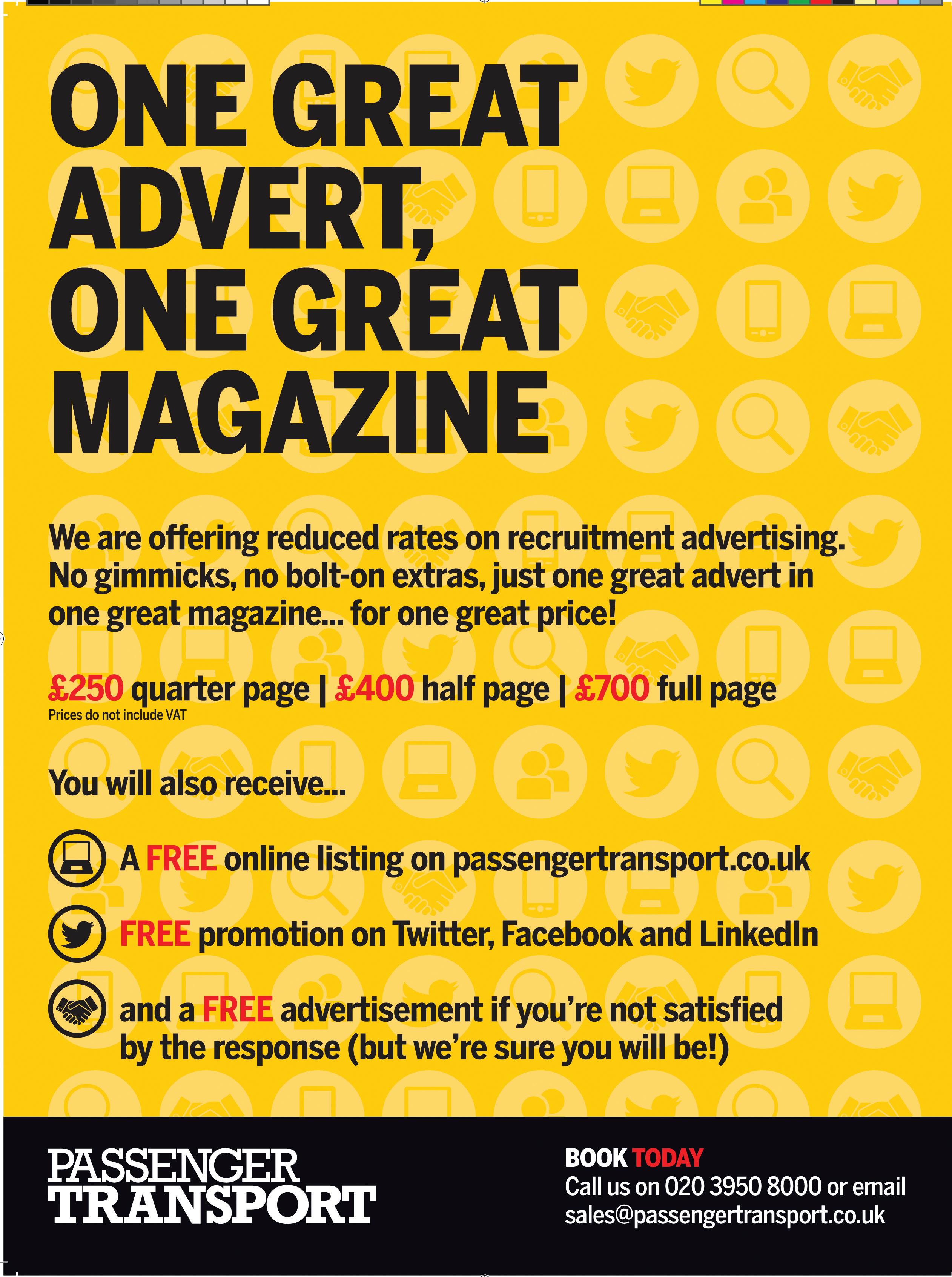
SWR launches new sustainability strategy
economic growth.
STRATEGY
South Western Railway has launched a new sustainability strategy that sets out a programme to serve, safeguard, and strengthen both its people and places, and the planet.
The strategy, titled Journey to a Better Future, is an ambitious commitment to become a net-zero carbon train operator by 2040, which is ten years ahead of the UK’s overall legal deadline, and expands on the company’s mission to become an industry leader in all aspects of sustainability.
The strategy’s launch coincides with fresh public polling carried out by YouGov that shows the public is more likely to think policies for tackling climate change should take priority over policies that achieve high
CHAUFFEURED IN STYLE BY NCT
Nottingham’s lord mayor uses the bus for duties
CAMPAIGNS
Nottingham’s lord mayor, councillor Wendy Smith, is fully supporting Nottingham’s aim to be carbon neutral by 2028, by hopping on board Nottingham City Transport’s fleet of low emission buses when travelling to civic duties in the City.
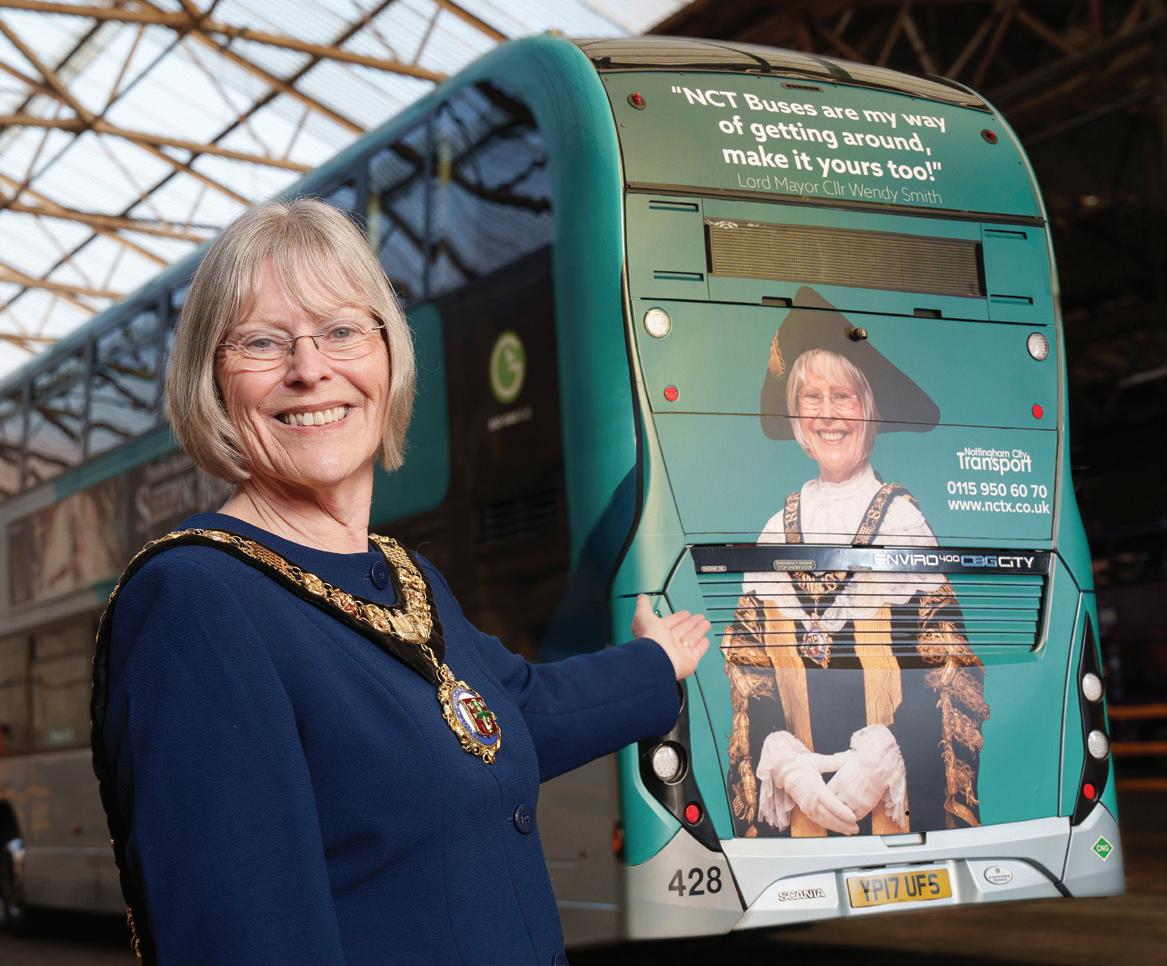
Smith’s passion for travelling by bus and encouraging others to follow her example is being promoted through a full-sized bus back advert, which was recently unveiled at NCT’s depot.
The polling found that almost half (49%) of the public believes that policies tackling climate change should be prioritised, even if economic growth is slower
South Western Railway believes railways will be crucial to building a more sustainable future for the economy and society, and aims to play a more active role in supporting communities, customers and colleagues across its network, and of all backgrounds and needs.
Contained within the Journey to a Better Future strategy are a number of additional commitments. These include ensuring that the company is
net biodiversity positive at all its stations and depots, securing top accreditation under the government’s Inclusive Transport Leaders Scheme, and publishing and actioning a diversity, equality, and inclusion strategy roadmap.
Claire Mann, managing director of South Western Railway, commented: “This polling shows that, even during times of economic hardship, people want us to prioritise doing things in a more sustainable way.
“Our bold sustainability strategy is designed to deliver just that, setting out a series of pledges to have a positive impact on our people, places, and ultimately our whole planet.”
CALLS TO COACH OPERATORS
ZERO EMISSION VEHICLES
The Zero Emission Coach Taskforce will shortly begin drafting a report which identifies potential solutions, collaborations and recommendations that will enable operators to decarbonise.
The Confederation of Passenger Transport says that it is vital this work is supported by reliable data.
ZECT needs the help of coach operators to ensure the voice of the sector is heard. CPT, in collaboration with the Department for Transport, has therefore developed a survey which aims to:
Provide a specification for a zero-emission coach;
Collate robust coach data to help in its discussions with government; Provide an insight into the industry for government ministers to better understand the sector and inform their future policies.
The survey asks questions about the coach operator’s business, fleet, the services they operate and zero emission vehicles. All data provided will be kept confidential.
The DfT has commented on the survey, emphasising the value of this data: “We welcome the work of the CPT Zero Emission Coach Taskforce and look forward to receiving the final recommendations. However, to ensure that the recommendations reflect all aspects of the coach sector, we need to ensure that they are underpinned by an accurate and comprehensive understanding of industry data. We would therefore urge all interested coach operators, who have not already done so, to complete the CPT survey so all views can be considered.”
Smith: ‘Using the buses is a quick, easy and relaxing way to get to events’
The survey can be accessed at www.surveymonkey.co.uk
14 | 13 January 2023 www.passengertransport.co.uk
ENVIRONMENT
“Even during times of economic hardship, people want us to prioritise doing things in a more sustainable way”
Claire Mann, South Western Railway
Half of UK public would pick climate policies over economic
Opportunity to shape zero emission future
/r/ZECTphase2
East Yorkshire to use big data to aid network
Technology will boost punctuality and scheduling efficiency
BIG DATA
In response to shifting travel patterns and congestion from the pandemic, East Yorkshire Buses is partnering with CitySwift in 2023 to leverage big data and mobility intelligence across their network.
Using CitySwift’s Evolve module, Go-Ahead-owned East Yorkshire Buses will automate data analysis from big data sources across their network. CitySwift’s engine will then transform this big data analysis and insight into AI-powered runtimes.
These runtimes will drastically improve punctuality for the network and service reliability for passengers. The automated analysis and schedule optimisation on the CitySwift platform will turn weeks and months of analysis into hours and minutes for the Scheduling team.
Ben Gilligan, managing
director of East Yorkshire Buses, commented: “2023 will be a new phase for the team at East Yorkshire Buses as we put a greater emphasis on big data and runtime optimisation to power

TfW using AI to improve bus network
Transport for Wales has partnered with mobility intelligence company CitySwift to use AI technology to improve the experience for bus passengers in Wales.
TfW are on a transformational journey to improve public transport across Wales and encourage more people to use it.
The data analysis work with CitySwift has provided TfW with access to new insights and AI-powered runtimes.
Through the data provided, TfW were able to access performance insights for five of Wales’ major bus operators focusing on demand and movement pattern analysis. Using
our network, helping our teams to meet and exceed our goals.”
Stuart Fillingham, head of commercial at East Yorkshire Buses added, “We are thrilled to be able to use big data and AI-
powered runtimes to support our talented commercial team, giving them time back in their day so they can focus on more strategic decision-making for the network, passengers and drivers.”
The team at East Yorkshire Buses will benefit from CitySwift’s rapid deployment and scenario modelling capabilities as they approach network planning from a customer-centric perspective, in response to the pandemic and the resulting new movement patterns and congestion challenges.
CitySwift is a big data company that powers major bus networks across the globe. Since its inception, CitySwift has built the world’s first Mobility Intelligence as a Service platform, offering bus network providers the precise insights they need to quickly adapt and operate their networks for efficiency, profitability, and growth.
CitySwift CEO, Brian O’Rourke, commented: “We’re looking forward to working with the East Yorkshire Buses team across 2023 as they use mobility intelligence to deliver a reliable and punctual service while balancing resources and passenger demand in their network.”
this data, TfW are able to improve bus schedules and punctuality, offering a much more reliable, convenient service for passengers with faster journey times.
Andrew Sherrington, head of bus network and service development at TfW said: “CitySwift has given TfW a better holistic understanding of how the network moves. For the first time, we can access detailed punctuality, reliability, and efficiency insights across Wales’ five major bus operators.
“This new intelligence will enable us to work with operators to make the bus a more attractive service for the people of Wales.”
CitySwift’s head of growth, John Aloy commented: “Using CitySwift’s mobility intelligence to access performance insights, demand data, and revised schedules, the team at Transport for Wales can deliver a more attractive, reliable, and convenient bus service for the people of Wales.”
www.passengertransport.co.uk 13 January 2023 | 15
INNOVATION & TECHNOLOGY
Ben Gilligan
Data offers better holistic understanding of network
“2023 will be a new phase for the team at East Yorkshire Buses as we put a greater emphasis on big data”
Ben Gilligan, East Yorkshire Buses
NORMAN BAKER

Visit the West Mids Rishi, but don’t fly
Chartering a private jet to travel from London to Leeds suggests that our airborne PM is not grounded on transport priorities
How the other 0.001% live.
On Tuesday this week, we learned that the prime minister had travelled to a medical centre in Leeds to meet patients and staff. He decided that “the best use of his time” justified taking a luxury private jet the 200 miles to get there, notching up a five-figure bill for the taxpayer in the process.
The train to Leeds from London takes about two hours and 15 minutes and even an open first class return would only have cost the taxpayer around £300.
A&E? Appalling and extravagant. Or H - hypocritical, as it was not very long ago at COP 27 in Sharm-el- Sheikh that the PM was urging other world leaders to stick to their climate commitments.
Private jets emit up to 14 times more harmful emissions than a commercial flight, and 50 times more than the equivalent train journey. The PM will have emitted around two tonnes of carbon on his flight to Leeds. The average person emits 8.2 tonnes over the entire year.
Perhaps it was not the “best use of time” that motivated the prime minister. Perhaps he was fearful of running into ordinary workers on the railway, especially as rumours suggest it was No 10 that pulled the rug from under a deal to end the strikes just before Christmas.
He may also have been dimly aware that his government’s tabling of a Bill to force workers on the railway to strike-break and run a minimum service would not have gone down well, and in fact is guaranteed to worsen
industrial relations.
The government maintains the proposed legislation is water-tight, and allows employers to sue unions who do not comply, or to sack workers who do not turn up for work.
We already have an acute shortage of train drivers. Is the government really sanguine that some of those we do have can be casually sacked?
I don’t think this legislation - assuming it makes it onto the statute book - can work. What is to stop a railworker getting a doctor’s note (assuming they can find a health professional, subject to the same legislation,
who has not also been sacked) and phoning in sick? What is to stop railworkers imposing a complete overtime ban? The railway is heavily dependent on overtime and will simply cease to function in any meaningful way if none is worked. What is to stop railworkers simply turning up, but then working to rule, or working at a snail’s pace?
You cannot force people at gunpoint to turn up for work, and then to work enthusiastically.
Transport secretary Mark Harper and rail minister Huw Merriman have understood the need for better relations between the government and the rail unions and have tried to sound emollient. Unfortunately, their voices are being drowned out by others elsewhere in government, including that of the airborne PM.
Mind you, his use of airborne travel might just be a lazy habit. It was not long ago he took a return helicopter flight from Battersea to attend a Conservative Party fundraising dinner in Wales, though at least on that occasion he paid for it himself. Well, what’s £10,000 here or there if you’re a multi billionaire?
Campaign for Better Transport recently launched a new policy to introduce a supertax on private jet use, multiplying by 10 the Air Passenger Duty payable by those on such flights, with the money raised going to support public transport.
Britain tops the European league for private jet use, accounting for 19% of all such flights within the continent. Such a tax would raise a tidy sum, around £1.4bn a year in fact,
 Rishi Sunak boards an RAF plane as he heads to visit a healthcare centre in Leeds
Rishi Sunak boards an RAF plane as he heads to visit a healthcare centre in Leeds
16 | 13 January 2023 www.passengertransport.co.uk COMMENT
equivalent to almost the entire Network Rail maintenance costs from last year. If the exemption from VAT is also ended, that could raise a further £623m a year.
Meanwhile, while the PM was adding to carbon emissions and air pollution - a major cause of health problems of course - on his way to his hospital photo-op, I put my faith in an Avanti West Coast service to get me from London to Coventry.
The good news was that it ran and was pretty much on time. The bad news was that the 10-coach electric train had been replaced by a 5-coach diesel Voyager, meaning chaos as all seat reservations were null and void on what was a rammed train, and that we ran on diesel under the wires for the entire journey.
I was in Coventry, because I wanted to learn about the development of a potentially ground-breaking Very Light Rail concept.
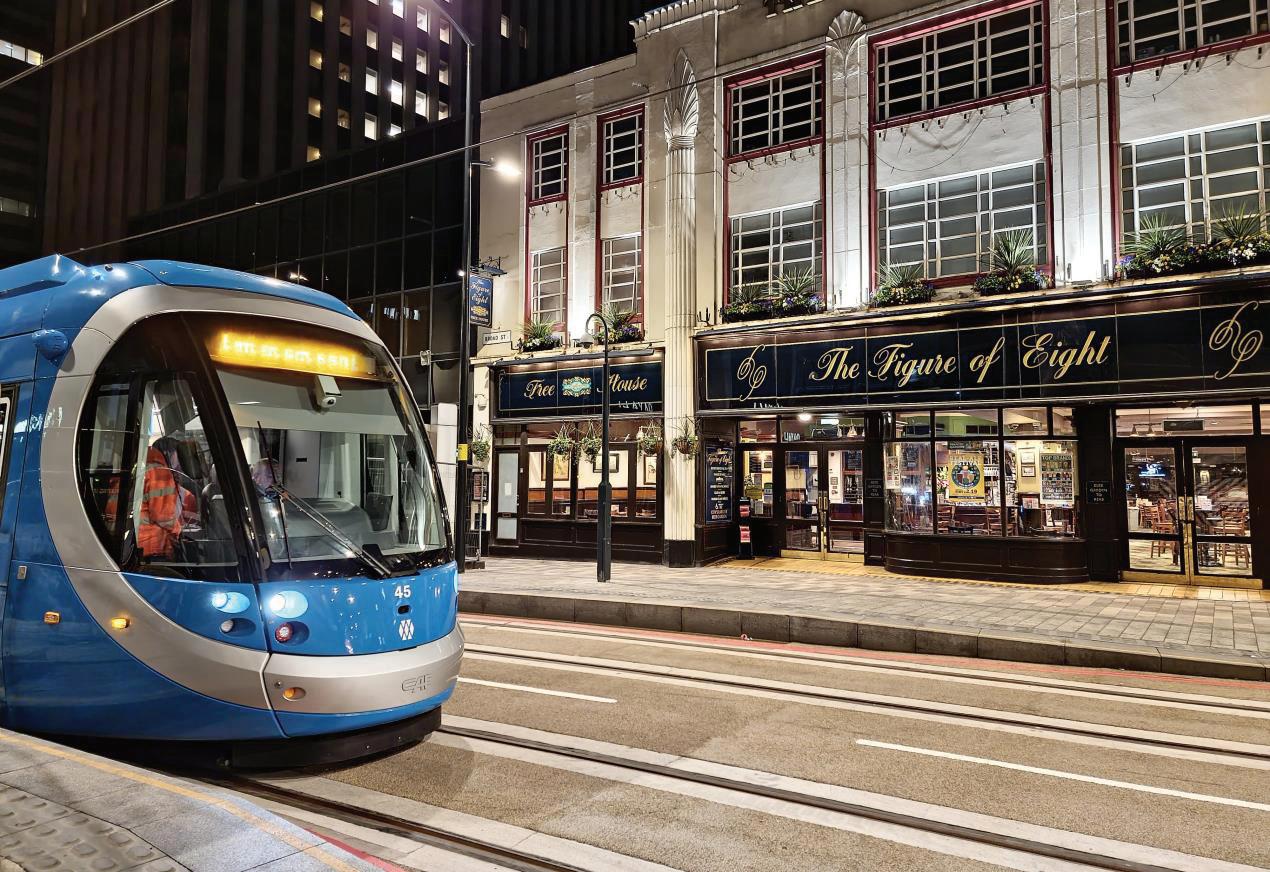
The travelling public likes light rail, and it was interesting to learn that light rail patronage in the West Midlands had bounced back more quickly and fully post-pandemic than it has on bus or heavy rail.
But the growth of light rail across the country has been hampered by the costs of laying track, costs which reached an astronomical £71m per kilometre in Edinburgh. Apart from the bureaucratic obstacles, such as the unwieldy requirements of the Transport and Works Act which seems to treat equally a new high-speed line and a new tram line, the need to move utilities has been a major burden.
In the case of Edinburgh, which I looked into when I was the minister covering light rail, it seemed clear that the utility companies saw the tram plans as manna from heaven, and were taking the opportunity to renew a whole load of creaky pipes and the like, and to bill the tram developers for the upgrade.
The beauty of the Coventry scheme is that the track form proposed will use slabs that do not require deep excavation and so will sit above existing utilities. The unique concept has been created and developed by the local director of transport, Colin Knight, with strong and consistent support from the lead Cabinet member Jim O’Boyle.
The estimated cost per kilometre of track is just £10m with this scheme which, if that can be achieved, opens up the prospect of Coventry exporting its concept to other cities in the UK and indeed further afield as well.
There is already interest from places such as Stoke and Wakefield. A dedicated vehicle has been designed and the next stage is to lay a section of demonstrator track close to Coventry station. Overall the scheme combines original innovation with the maximum use of existing technology to keep costs down. I reckon it’s a runner.
Elsewhere in the West Midlands, it is encouraging to see the pro-bus and forward-thinking policies that seemed to be shared across both Labour and Conservative parties locally.
Birmingham, home to Spaghetti Junction and the country’s prime example of how building more and more roads only generates more and more traffic jams, has at last turned the corner.
Car park spaces have been reduced by at least 2,500 since 2012, with consideration being given to more conversion to uses such as housing developments. Footway parking is being removed and through traffic being redirected away from the centre. Meanwhile, a Nottingham-style workplace charging scheme is under consideration.
In terms of public transport, we have seen an extension to the light rail scheme introduced, something I helped kick off as a minister. Cross-city buses are being introduced, and the metro mayor, Andy Street, is opening a clutch of new railway stations. It is particularly welcome to see the return of a WolverhamptonWalsall operation, which has been kept barely
alive as a “parliamentary service” since 2009.
A whole swathe of new hydrogen and battery buses are being introduced by the dominant operator National Express, and evidence from elsewhere in the country, notably that recently published in a report by Stagecoach, suggests that the arrival of new state-of-the-art buses can drive modal shift from car to bus.
Of course, much remains to be done in the West Midlands, not least of all the coordination of fares and ticketing across all public transport modes, and indeed cycle hire too. Furthermore, the absence of gates at the majority of railway stations, coupled with the short stopping pattern of many trains and the consequent challenge of checking tickets on board, suggests a high level of fare evasion which really needs to be tackled.
Nevertheless, there are clear signs of progress as the need to move away from polluting forms of transport takes root across the political spectrum. Perhaps the local politicians could invite the PM up to explain what is being done and why. And why even a rammed 5-coach diesel train to get him to Birmingham is a much better option than a private jet.
ABOUT THE AUTHOR
“Perhaps the local politicians could invite the PM up to explain what is being done and why”
Patronage on the West Midlands Metro has bounced back
www.passengertransport.co.uk 13 January 2023 | 17
Norman Baker served as transport minister from May 2010 until October 2013. He was Lib Dem MP for Lewes between 1997 and 2015.
ALEX WARNER

Railway continues to flirt with irrelevance
day? Now, there is uncertainty on a frequent basis, a new threshold has been breached which could be irreversible.

Last year, I questioned whether there would be a time in the not too distant future when the railway lost its relevance, usurped by other public services in terms of dependability for the nation (PT265). The diminished importance of commuting was hastened by the pandemic, and an industry that had, to a not insignificant extent, been mired in self-importance and complacency as well as beset by consistently inconsistent government policy. These were factors that would contribute towards its demise. In truth, I didn’t think the situation would unravel as quickly as it is now, but I genuinely feel that we’re not far away from that point of no return, a situation that has also been noted in the last week with several articles across mainstream media.
Remember in the midst of the pandemic when those of us working in the rail sector were rightly panicking about passenger numbers and trying to convince ourselves that they would return? If we had known that the end of Covid would have coincided with one of the longest and widespread periods of strike action in modern history, then I think we would have all given up the ghost and foretold the end of our industry as we know it.
Whether or not those who work in the sector know it or care, our troubled railway is fast slipping out of nation’s consciousness Once
That the circumstances of the last three years have changed my travel and living habits so dramatically is a worry for the industry - not because I’m particularly important (I’m not!), but as a lifelong rail enthusiast. If I’ve changed, then heaven help the casual customer. Every time, I leave my house, I glance across the road
now at Shepperton railway station and it is with a mindset of genuinely not knowing whether trains are running that day, or not. We’ve had so many days with no service due to strikes, engineering works or disruption, or a reduced service because passenger numbers necessitated a lessening of frequency, that I really have to prompt myself to wonder whether there is a service available. Sometimes in the past month, I’ve cared so little that I’ve not even asked myself the question, because I either assume it’s more likely that there aren’t any trains, or I’m just not bothered because I’ve got out of the habit of travelling. Remember the days when you would see a railway station or its presence on a map and you would automatically assume it was open and providing a service all day, every
What’s happened is that I’ve now, like so many others, reverted to the pandemic era of working from home. I admit I’ve become more discerning about my expenditure too - I’m running my own business, trying to establish it and costs are high with revenue low in these early months, so I think twice about a discretionary train trip. Unlike the pandemic, working from home isn’t that bad now either, because at least other pastimes are available to break up the monotony - during Covid, only Netflix and the model railway kept me sane, but a love of local walks the pandemic taught me late on has endured and of course this time, sports, entertainments and eating out, among other pastimes are open. I tend also to plan my travel properly, so I choose when the railway has a week when it is going to deign to be available and I’ll group loads of meetings into those days across the country - fewer journeys and those in an intense block, with lots of recovery time in the month afterwards.
I also think that the working generation has got lazier. The pandemic as well as rail strikes, mean there is no stigma about working from home now and this has also propagated a fixation with work-life balance. The pre-Christmas strikes were just the excuse that shirkers needed to indolently pack up for the festive period a week early - have you noticed how with each year, people down tools and put decisions into the New Year, much earlier? Before you know it, we’ll be calling it a day in November.
The railway has almost reduced itself to an ‘appointment to view’ arrangement. It is sleepwalking into positioning itself as a product that customers won’t instinctively use with regularity or if they only have a moderate need to make a trip. Instead, they will only make a journey if it is really vital and it will probably be scheduled well in advance.
Of course, there will be those in denial in the industry - generally those bigwigs who still convince themselves that they are household names in their communities and beyond. They will tell me I’m talking nonsense and that, once these strikes are over, that self-combusting apocalypse I’ve predicted isn’t going to ensue and the railway will always be mainstream and never niche. These same people probably
a common
milk bottles on doorsteps
these
Is the railway
the same way? 18 | 13 January 2023 www.passengertransport.co.uk COMMENT
sight,
are a rarity
days.
heading
won’t realise that the Royal Mail strike in the run-up to the festive period probably heralded the death knell on Christmas card sending. Mark my words, that concept is over, and in years to come we’ll be nostalgically talking about it in much the same way that we chuckle about how we ever used Filofaxes, or had milk delivered to our doorstep, or when Ceefax was the innovative way to find out the football results. You can almost see us tittering in a few short years about the ludicrous concept of spending three hours of every day commuting on a packed train, at the cost of several thousand pounds a year, just to sit in silence, gawping at a computer in an office and barely speaking to colleagues.
I also think that the sleepwalking into irrelevance is hastened by some public derision at the industry’s attempt to still be vocal during the adversity it faces. I don’t think that folk want to hear press releases or social media talk with the kind of rhetoric that is typically only associated with the industry or similar sectors that lack real warmth and engagement with its markets. Updates around ‘engineering works’, ‘planned upgrades’, ‘collaboration’, ‘stakeholder engagement’, ‘industrial action’, ‘passenger numbers’, ‘disruption’ and so on and so on, just irk. We’re sick of hearing this, we just want trains and with each passing month this kind of chuntering is just viewed increasingly as pointless noise from an era when the railway was relevant. It’s now falling on uninterested and deaf ears. It’s a bit like a disgraced public figure who would be best advised to disappear from the limelight and re-appear once the memory of their scandal has dissipated.
The extremely sad passing of rail industry legend Adrian Shooter at a time when the industry in which he made his name is at its lowest ebb, provoked among many a period of contemplation. As the tributes poured in for Adrian, there were so many stories of his charismatic approach, his entrepreneurial spirit, verve and commitment to resonating and engaging with his own local market, most notably at Chiltern as well as his determination to mentor younger industry professionals. I’m sure I wasn’t the only one to reflect on how his approach was a throwback to a more exciting era. The industry culture and conditions were far better suited to Adrian in the prime of his career, a couple of decades or so ago. How frustrated would he have been as a manager
making his way in rail in this generation?
Of course, part of the problem is that there aren’t many Shooters left on the railway anymore and where they exist, their wings have been clipped. The strike has been interesting in that train company managing directors have tended to talk in scripted platitudes to the media, or been fairly quiet, reinforcing the view that they are generally powerless in the negotiations with trade unions and power sits on a national and ministerial level. I’d suggest that if it were left to some of the more experienced managing directors to take the bull by the horns in their own backyard, the strikes would have ended or certainly been less widespread. Can you imagine a Chris Garnett, Michael Holden, Chris Green or Adrian Shooter being reduced to such a supine, almost irrelevant role in the current situation?
There’s talent in the rail sector, most definitely, but it’s stymied by both the structure and the prevailing culture that raises disapproving eyebrows towards those who might rise above the parapet. It’s also a sector that needs to be less defensive and sensitive to criticism, whilst also more readily welcoming the innovation of suppliers and alternative ways of approaching challenges of which the sector has often failed - such as the provision of rail replacement, frontline staffing, catering and much more. So too, the backslapping must stop - I’ve heard of and been present at meetings where indicators relating to customer service delivery have been shocking beyond belief, but there’s been a complete reluctance to recognise and address these. At best, one individual in the meeting might have the guts to call out the poor performance, but afterwards are very much seen as a troublemaker. It’s not career enhancing to highlight a sea of red in a scorecard.
By contrast to rail, the bus sector feels like it’s on the cusp of a revival and in the ascendancy. Obviously, a bit of government support helps and the £2 flat fare initiative for the remainder of the winter months has been a positive story that helps folk during the cost of living crisis and re-engages the concept of travelling by bus as a force of good. As someone who has recently launched a business to market and accredit, from a customer service perspective, scenic transport journeys, I was delighted that The Guardian among other journals used the announcement of the fares cut to encourage folk to get onboard a bus to
enjoy the scenery. Indeed, in setting up my new initiative, it’s been noticeable and heartwarming how much energy and enthusiasm there is among marketing managers in the various bus companies and the extent to which they’ve got the opportunity to ‘make things happen’. What’s great for the future of the bus industry is that many of these marketing folk are young and full of enthusiasm, bringing a fresh perspective and energy and come from diverse backgrounds - this is very much a sector that is attractive for a fledgling marketing manager to build a career and where it is still seen as virtuous to look to grow new markets and products, trial innovation around customer service and create exciting local and regional brands, within the same large owning groups who, in rail, have had their clout, in many places, reduced to insipidness.
Where we go from here is anyone’s guess. My take is the strikes will drag on and with the railway becoming increasingly irrelevant there’ll be less of a clamour for a breakthrough in negotiations. I also sense a bigger prominence being given to the crisis bordering on meltdown in healthcare, right now. Summer will come round soon, kids not needing to go to school, holidays abroad, working in the back garden, simple, local, more affordable pleasures (in these testing times), a pint and nice walk or home entertainment, a BBQ with mates and then on the news, there’ll be the seasonal hot summer’s night riot or two and we’ll realise that, along with investing in nurses, we desperately need more police. Then autumn will arrive and this whole annual, cyclical saga will continue with people caring less about the railway with each passing year. Us trainspotters will still be interested, but it will all be centred on yesteryear when what we loved had genuine meaning for large swathes of the population, a bit like my 87-year old Dad reminiscing about his number one passion, Speedway - of packed stadiums and exhilarating racing, seven nights a week at towns and cities all across the UK. Those were the days, we thought they’d never end. But they did.
ABOUT THE AUTHOR
Alex Warner has over 29 years’ experience in the transport sector, having held senior roles on a multi-modal basis across the sector
The railway has reduced itself almost to the ‘appointment to view’ arrangement”
www.passengertransport.co.uk 13 January 2023 | 19
GILES BAILEY
A new direction for mobility in cities
pandemic.
Many articles have been written about the future of mobility, post pandemic. Themes include.
The nature and rationale of work has changed. For some this is marginal and others substantial. For many it is welcome and others a difficult transition. Nevertheless, it has happened and the situation will continue to evolve. There will be no return to ‘normal’whatever that was! Changes to work behaviour fundamentally alter the nature of travel and the use of the transport system.
Hygiene, cleanliness, personal space and environment will continue to have a large impact on how people choose and perceive their travel choices. People will still consider using crowded services, but this wider context will be in the minds of users - and importantly non-users.
When faced with ‘travel stress’ - industrial action, which unfortunately has become endemic in the UK in 2022 and will continue in 2023, extreme weather, renewed health scares, fuel price spikes, or even very pleasant weather many will simply choose not to travel and will be perfectly able and comfortable to continue with work, social interaction, shopping, leisure, education, etc, without the need for the transport system. The system has lost its monopoly on mobility!
Digitisation needs to be at the centre of mobility thinking and all innovation Technology solutions should, however, not be used to divert the focus from a strong delivery

based service culture in transport.
Our industry needs to scale compelling and effective mobility solutions to meet the increasing challenges of climate change and sustainability across society.
Many of these changes continue to emerge, and will do for many years to come. They will also be impacted by further societal changes such as fuel prices and the aggressiveness of the response to climate change. But, they are very real and pervasive. It should also be noted, that as a resident of London, one can see that these changes in behaviour are not being universally delivered. I note more change in my home city than behaviour in other markets in Europe and that London seems more similar to the that seen in New York City.
What are the statistics telling us?
Evidence of changes in (public) transport demand continues to emerge and the statistics evolve as the market realigns to the new normal. Also, some ‘private’ operators are often less forthcoming in releasing statistics in a changing, and competitive, market.
UK road traffic remains below pre-pandemic levels, in aggregate. This may surprise many who have seen sharp increases in traffic since the days of empty roads in 2020 as well as the subsequent impact of traffic calming measures.
Road traffic is 12% lower (to September 2022) than before the pandemic in the UK. This is particularly for car traffic. Lorry and van as well as cycling traffic is up versus before the pandemic which likely relates to the increased use of home deliveries as well as the general increase in the popularity and support for (shared and personal) micro-mobility solutions.
Rail demand in the UK in the year to June 2022 has approximately doubled from the depths of the pandemic in 2021. This demand is approximately 60% of early 2020 figures. There are some differences in urban markets, near city markets and intercity rail travel.
The previous rail market has not, however, returned in its entirety in the UK. Anecdotally, weekend demand continues to be more robust that weekday demand.
In terms of bus demand, Department for Transport statistics indicate that English bus journey demand is down versus pre-Covid by approximately 30%, with a smaller decline in London. (June 2022). There is however, a long term decline in bus journeys outside of London in England that predates the pandemic effect.
As always, the situation in London is slightly different due to the scale of the market and demand as well as the abilities of Transport for London to respond to these challenges in its unique business environment.
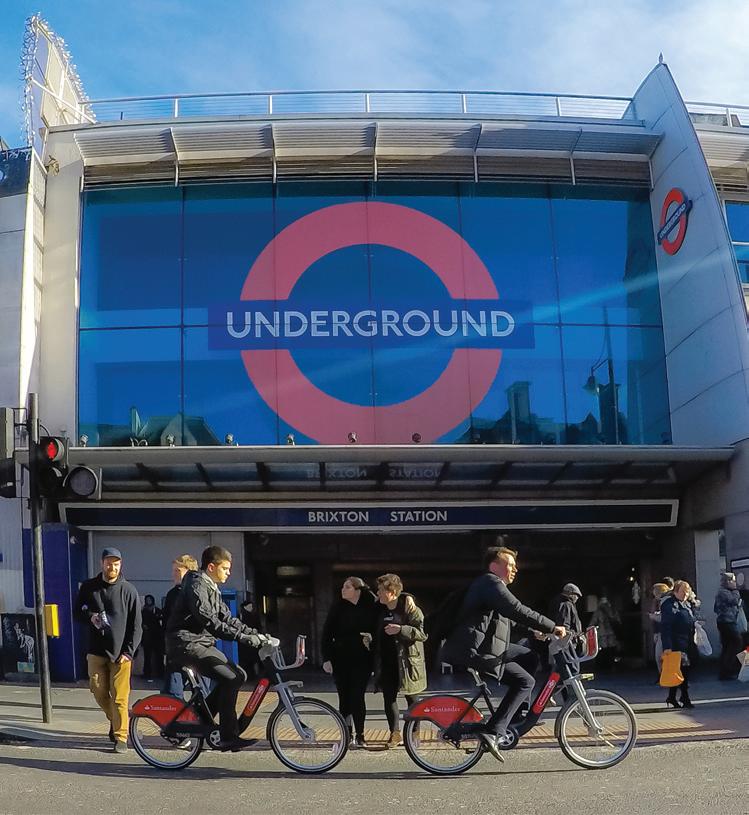
Patronage on TfL networks was approximately 80% of pre-pandemic levels in the autumn of 2022 across the weekly average. Weekend demand on the Tube and bus networks is very near pre-pandemic levels.
Meanwhile, there has been a sharp increase in cycling and walking in London over the course of the pandemic and this continues. Cycling is up to 40% higher than before the pandemic. This mirrors changes seen in many markets around the world and lays out the challenge to government authorities to
The way we travel is changing, accelerated by the
What are the statistics telling us and what does this mean for cities? Change is happening in
London
20 | 13 January 2023 www.passengertransport.co.uk COMMENT
provide the on-street infrastructure to support the growth in interest and use of micromobility, particularly versus offering (more) space to car drivers.
The context in other global markets is also illustrative of some of the challenges in the mobility industry. Trends vary widely in some regions of the world and in Asia in particular. A number of European public transport markets have been impacted by national free or significantly discounted rail/public transport ticket schemes - such as in Germany and Spain. These reduced fares have significantly spurred public transport demand. The rationale for these schemes is typically associated with the climate change benefits of encouraging public transport as well as a means to address the ongoing “cost of living” crisis. Travel behaviour continues to adjust to post-pandemic realities but, these schemes have attempted to embed high levels of public transport use in this new reality. A related set of issues for rail operators, particularly in Germany, has been to rapidly increase capacity and network robustness to deal with this increased demand.
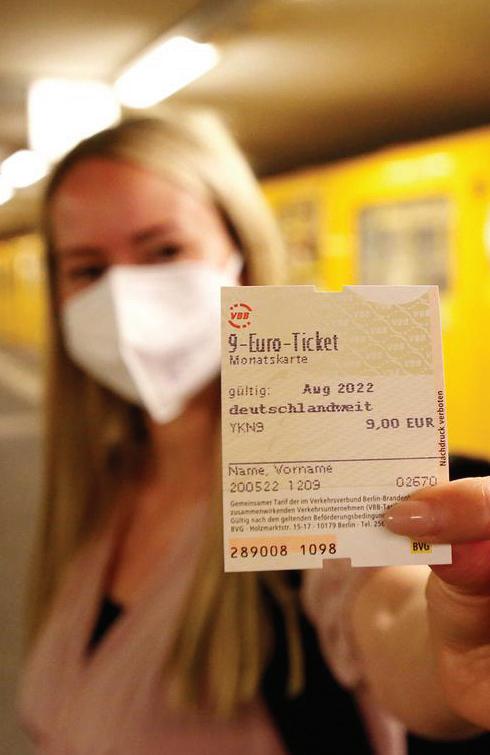
While some European cities seem to be near a full return to overall public transport demand, many seem 10 to 15% off the earlier levels with much of the impact in the daily peaks. Weekends, however, seem to have robust, if not increased, demand versus before the pandemic.
It is interesting to also look at some statistics from certain markets in the USA, particularly regarding its reference to London and the office based work culture in the UK and USA.
The current situations vary from slow demand recoveries in the San Francisco Bay area of California, where there has been a widespread embracing of home working alongside a public transport system that had a strong commuter focussed network which moved large numbers of people to central San Francisco. Meanwhile, Los Angeles has seen a robust recovery in demand from its more multi-centric public transport system.
New York City has seen a steady recovery in public transport demand, but not to prepandemic commuting levels. NYC’s subway and buses were averaging 65% of demand at the start of December 2022, while the regional rail system is at approximately 70%. Public transport demand versus pre-Covid is again typically higher on weekends. It is noted that NYC’s bridges and tunnels are now operating
at 100% of pre-pandemic levels.
The situation for many smaller US cities, where public transport use has always been a minor mobility option, has been difficult as they have seen an increase in this option becoming even more sidelined. It is noted that this is leading to several smaller US cities adopting “free of charge” public transport!
What does this
mean for cities?
The harsh reality is that the public transport market has become a more difficult and complicated environment. And the market is probably less financially robust. However, the public will to invest in public transport still seems to be strong, at present.
Customers/consumers/travellers have more mobility options and probably want even more. They also demand, as in most other markets, increasing service quality, consistency
and information across the consumer experience. However, the most lucrative part of the market - the peak - has been weakened! Travellers throughout the day are a much more heterogeneous group with many different and subtly evolving needs and decision points. This requires an even stronger customer focus from our industry.
The expectation of ‘getting back to normal’ is ill-judged and shortsighted. New opportunities, challenges and expectations exist.
Public and stakeholder support for public and sustainable transport investment seems to continue to remain strong in most markets in the UK as well as in Europe and globally. In fact, in many cities globally public transport investment in order to remake the offer has never been higher.
As an industry commentator, however, I suggest that the most compelling UK issue in public transport, including shared and private micro-mobility, is service quality and consistency. This is in order to ensure public and stakeholder support for radically improved intra-urban transport solutions in the regional UK cities that deliver on this diverse set of transport needs and at a panurban scale. I don’t see this moving sufficiently quickly to deliver substantial improvements to meet the ultimate needs of climate change as well as customer expectations.
Without these radically improved regional and intra-urban service offers, the current pervasive goodwill to support sustainable transport offers may/ will dissipate over time. We then risk reverting to solutions that focus on attempting to make private, albeit somewhat greener, mobility solutions attempt to deliver our transport needs. While this may somewhat work in some cases, it will ultimately not deliver the truly radical, impressive and sustainable transport solutions we could offer, and certainly which are being delivered in many other global cities!
ABOUT THE AUTHOR
Giles K Bailey is a Director at Stratageeb, a London based consultancy assisting businesses think about their strategic vision and innovation. Previously, he had spent nine years as Head of Marketing Strategy at Transport for London.
“The expectation of ‘getting back to normal’ is ill-judged and shortsighted”
“While some European cities seem to be near a full return to overall public transport demand, many seem 10 to 15% off the earlier levels”
Germany discounted tickets to lure users back
www.passengertransport.co.uk 13 January 2023 | 21
NICK RICHARDSON

What future does the bus industry have?
Recent events have shown that all is far from well in the commercial bus industry - how can we resolve the problems?
The prospect facing the bus industry includes many changes to services with reductions and withdrawals, the inevitable consequences of a funding model that is broken. With many services no longer being profitable, bus operators cannot afford to run them at a loss in perpetuity. Recent sharp rises in operating costs, notably labour and fuel, accentuated by a number of other factors, have created a scenario in which retrenchment is the only option to survive. The problem of staff shortage isn’t going to disappear overnight and has compounded the challenge of maintaining a decent service. The fact that the funding situation is dire is a depressing reflection of deregulation - despite decades of effort, some bus operators are simply not going to survive, let alone compete with each other if they can’t afford to provide any services beyond the basics.
Shrinking network
Business closures mean that while some services and contracts can be transferred to another operator, others will simply end. In some places such as Cambridgeshire, there has been uproar at proposed service cuts which has led to some being retained. However, this is only a short term solution. This is not a problem specific to the bus sector - banks are closing in many small towns and suburbs with the rise in online activity and the rising costs of maintaining premises and staff. The number of pubs, especially in more sparcely populated
areas, is in decline. Regardless of what the consumer may wish for, the reduction in services results from the economic realities of a supposedly free market economy. These same factors apply to bus operators which are not charities and need to make the balance sheet balance. Hardship may well be caused but that is what happens when circumstances change. However, some of those opposed to service withdrawals may not be as regular users as they would have you believe but recognise the importance of buses in case they have need of them at some point.
For many places, the number of bus users has been in steady decline for decades, the exceptions being where the offer has been reconsidered in detail and adapted accordingly. This is the silver lining - bus services can have a bright future, especially considering the context of Net Zero and climate emergency. The constraint is not passenger transport providers, it is governments that can’t face up to the scale of actions needed to address their own policies. This became evident in Bus Service Improvement Plans (BSIPs) which were supposed to be ambitious and transformational. The reality is that while most of the BSIPs lived up to the expectations of government, the level of funding available did not. What started as a £3bn budget was watered down to £1.2bn with the consequence that many submissions received nothing at all. Inevitably it is impossible to deliver transformational change in an industry that is battered by cost increases
and post-pandemic blues without substantial financial support.
Leaving the market
Casualties have included Yellow Buses, a long-established presence in Bournemouth. As in many places, the amalgamation of bus companies resulted in a duopoly with Yellow Buses and Go South Coast being the big two covering the Bournemouth and Poole area. Go South Coast in the guise of ‘Morebus’ has managed to build demand successfully and with both companies competing, the standard of services overall has improved.
With the sudden demise of Yellow Buses, Morebus has managed to cover many of the lost services, helped by incentivising redundant Yellow Buses staff to transfer. With Morebus in place, in effect as an operator of last resort, this provides the basis for consolidation and further improvement. This benefits the passengers and is not detrimental to the ghost of competition because the quality is good. If the operator taking over had been poor, then the situation could have been very much worse.
Then we turn to Southampton where First is managing the withdrawal of all its city services. This should set alarm bells ringing because the decision is to exit a market where there is a decent demand base. Rebranding First’s services as ‘City Reds’ and having a new depot a few years ago was not enough to stem the decline, pushed over the edge by the current financial situation. This wasn’t helped by the proposed introduction of a financial penalty for any bus that wasn’t to EuroVI standard as soon as it left the depot or longstanding political resistance to bus priority measures. If a major operator can’t make services pay in a large city then there is clearly a problem. Once more the breach is to be filled by Go South Coast, this time involving its Bluestar business. Bluestar provides a wide range of good quality services and also holds the Unilink contract for the University of Southampton to meet the student demand and also provides public bus services. For over a decade, the demand for bus services in Southampton was static with Bluestar gaining at the expense of First. With better services and changing circumstances, Bluestar will have another monopoly.
Essentially, Go South Coast will dominate all services between the Bournemouth
COMMENT
22 | 13 January 2023 www.passengertransport.co.uk
Southampton
near-monopoly. As with Bournemouth, Southampton bus users may benefit from better integrated services and a more innovative approach.
Other retrenchment

Now it appears that the Transforming Cities Fund (TCF), another government initiative under the levelling-up heading, although rather vaguely applied, is to be paused. In other words, those authorities that had been awarded funding for measures including bus priority in a very truncated spending period are now on hold. It appears that no commitment from government is secure; ‘pause’ usually means review which generally leads to budget cuts. This is a familiar story and it appears that TCF and similar will never produce anything transformational, not least because with constrained budgets and absurd delivery periods, it falls far short of what is needed. Add to this the alarming lack of revenue funding from local authorities for anything non-statutory such as bus services. In terms of value for money, starting
programmes with a bang that soon becomes a whimper is bound to be ineffective and do nothing to create the social outcomes to which government aspires. If everything that involves funding is up for review, then we can expect nothing of any substance for a while yet. It could be argued that concentrating spend in a few areas with particular needs would be better value for money but politics will ensure that this won’t happen. Instead, peppering a bit of money across a selection of areas is likely to generate next to nothing towards improvements in bus services or anything else.
Widespread problems
The other side of this lack of funding is rural communities. While urban areas get some attention, the prospects for bus services in many rural areas are beyond bleak. It would be best to find some means of securing a future for those bus services that are well established (and it isn’t demand responsive transport).
There needs to be wider understanding that unless someone pays for services, they won’t survive. Consequently, many people will find themselves isolated and if they wish to access
any basic functions such as employment, they either have to afford a car or relocate - this is the reality of service withdrawals, and the bus will be consigned to the same history as village shops, post offices, pubs, etc.
If the traditional funding mechanisms and commercial realities can no longer deliver decent bus services, then franchising may be a solution provided that it is accompanied by funding commitment. If bus services are valued and the commercial market has been compromised to the point of destruction, then franchising in some form may have a role. However, it all comes back to funding or rather a lack of funding. Something needs to change soon to avoid disaster.
ABOUT THE AUTHOR
Nick Richardson is Technical Principal at transport consultancy Mott MacDonald, chair of CILT’s Bus and Coach Policy Group and a former chair of the Transport Planning Society. In addition, he has held a PCV licence for over 30 years.
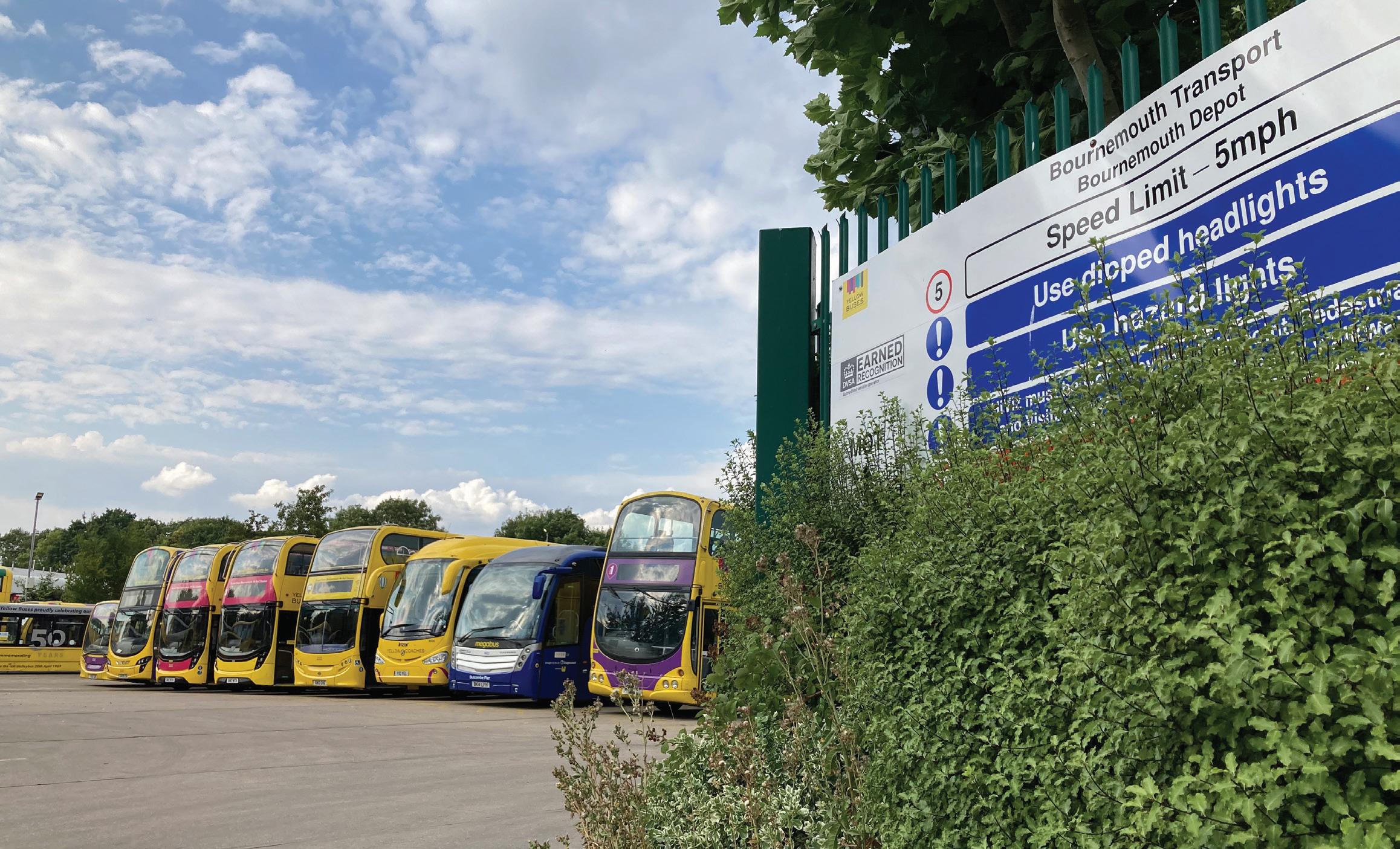
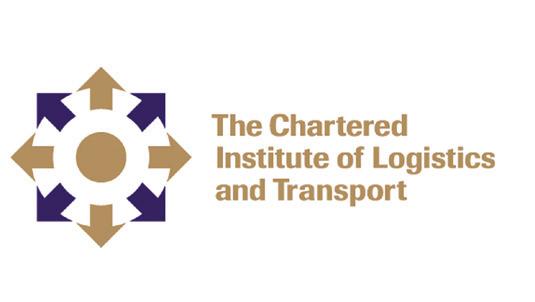
IN ASSOCIATION WITH: www.ciltuk.org.uk Tel: 01536 740100 @ciltuk
Christchurch Poole conurbation and
with a
www.passengertransport.co.uk 13 January 2023 | 23
Bournemouthbased Yellow Buses was a high profile casualty of 2022
Awareness and action will lead the change
CMAC Group has always championed women within the sector, and has conducted a selection of interviews to bring awareness to this important topic. We begin with Charlene Wallace, customer and freight director for Network Rail
How long have you worked in the transport sector?
I have worked for over 30 years in transport and have worked within rail, airline, bus, light rail and ferries!
What attracted you to choose to work in the transport sector?
I’ve always loved transport, my dad worked in the rail industry, and I was fortunate to be able to travel a lot. While returning from holiday I saw a recruitment advert for cabin crew, and it really appealed to me, so my career began then! I have since travelled worldwide, performing front line customer facing jobs and progressing to senior executive level roles.
What is your greatest professional achievement or career highlight?
I was nominated as a ‘Railway Hero’ during the Covid pandemic for services to the rail industry. I was one of a small number of people recognised within the transport sector and this was part of a yearlong exhibition showcased at the National Railway Museum.
Do you think having more women in senior leadership roles helps to make transport systems safer and more inclusive?

If we are going to improve safety and inclusivity within transport, we should make sure that people from all demographics have access to education mechanisms that best equip them to make the right decisions across any situations they encounter.
Do you feel that women are equally represented within the transport sector?
I believe we are trying to bridge the gap and there are certainly more women in
our industry now than when I first started. However, we still need to attract more talented women to our industry. Awareness and action will lead the change.
Have you ever faced any challenges as a female working in this industry?
Yes, I have encountered many frustrating behaviours and situations. Sometimes being a woman in a senior position has come as a surprise to some people and often I’ve been overlooked in conversations where people thought I may not understand the details of the discussions due to being female.
What should the industry be doing now and in the future to attract and retain more diverse talent?
Diversity will make us stronger as an industry, we need to support and recruit the best talent we can by making diversity a priority from the top down and it has to be an inherent part of our culture. We need to make sure our industry is inclusive and accessible to all.
Why should women be interested in working in the transport industry?
What does it have to offer?
The transport industry offers such a wide variety of opportunities for women. It would be great if we could attract more women who can contribute their views, skills, and different perspectives to help us build on all the good work already achieved and help create a more equal industry.
What advice would you give to other women who would like to work in the transport sector and those who aspire to be a senior leader in this industry?
You can do it! Multiple perspectives often bring better solutions. There are so many employers who will support and encourage your career journey and will adapt their current ways of working to make it happen. Many companies now understand that engaging and retaining more women in the workplace will have a really positive impact on the wider industry.
What do you like most about working in the transport industry?
No two days are ever the same, I love the challenges that come with the transport sector and the opportunity it gives me to make a difference for our customers and front-line teams.
What does International Women’s Day mean to you?
International Women’s Day allows us to recognise the positive contributions and achievements of women in our industry. It also reinforces how awareness has been raised not only in our sector but internationally.
To find out more about CMAC Group, visit www.cmacgroup.com
“I have worked for over 30 years in transport within rail, airline, bus, light rail and ferries!
24 |13 January 2023 www.passengertransport.co.uk PROFILE
Charlene Wallace
GREAT MINSTER GRUMBLES

Rail proposals could remain in limbo
the private sector to fund and finance specific rail projects as Stephen Hammond suggested? I’m not so sure, simply because we’ve been here before with the Market Led Proposals initiative which encouraged the private sector to come forward with projects they were willing to finance and fund - an initiative, you may recall, that got killed off by a combination of opposition from Network Rail, and concerns from the Treasury about the need for proposed projects to be subject to competitive procurement processes. Why would a private sector company or consortium propose a specific project only to have its intellectual property put out to a competitive process?
I wonder what New Year’s Resolutions our transport ministers have made. I would like to think that sorting out the proposed rail reforms would be top of the list as the ongoing speculation about whether these reforms will be taken forward as proposed in the WilliamsShapps Plan for Rail, or whether something different will be proposed, is unhelpful.
Just before parliament rose for the Christmas recess the Conservative MP for Wimbledon, Stephen Hammond - himself a former rail minister, of course - secured a Westminster Hall debate on ‘the future of rail services’ where he set out his own concerns about the proposed reforms. His central concerns are, first, that Great British Railways won’t be so much the Fat Controller but, as he put it, the “Staggeringly Obese Controller”, given that GBR will be responsible for, well, pretty much everything. Second, he highlighted that the proposed reforms place too little emphasis on the benefits that the private sector has brought to the railways, especially in terms of encouraging the participation of the private sector in the funding and financing of specific projects.
In this context, Hammond bemoaned the proposed Passenger Service Contracts, expressing the hope that they should be “a journey rather than an end in themselves”, suggesting, if I read the Hansard transcript correctly, that a return to franchising would be welcome. This prompts me to repeat a point I have made before - that franchising in itself
was not broken as a concept. Rather, it was the way franchises were specified and procured that was the problem.
Our new minister of state, Huw Merriman, did not say too much by way of a response to Stephen Hammond - one would not really have expected him to - but a couple of points are worth highlighting. First, he said that that he and the secretary of state, Mark Harper, had been “reviewing the options for reform” and that “we expect to be able to provide concrete proposals as to what the reform will look like very shortly”. Well, that’s progress, as we need to end the media speculation as soon as we can. Merriman’s comments suggest that the reform proposals will indeed be revised compared to those proposed in the Plan for Rail
Second, he gave an assurance that “the private sector will be right at the heart of the reform proposals”. Well, that’s interesting as it implies that the originally proposed Passenger Service Contracts will be reformed to provide greater incentives for passenger service operators to grow the rail market than had originally been proposed. But will it allow
Third, and perhaps most interesting of all, Merriman seemed to imply he supported the introduction of many more open access operators. We’ve been pretty successful in blocking most open access applications on the grounds that open access operators simply divert existing passengers from franchised operations rather than actually grow the market. Merriman seems to take a different view, arguing that “open access definitely has a place, but we need to reform the entrance requirements so it is not constantly turned down... I am very excited about those possibilities”.
But unfortunately we are none the wiser as to when the necessary legislation to put effect to elements of the reform proposals, mainly the creation of GBR, will be forthcoming. Merriman would only say that legislation will be introduced “when parliamentary time allows”. That is the time-honoured phrase used by ministers when either they don’t have a clue, or there is little prospect of any legislation in the foreseeable future. One possible interpretation of his comment is that we won’t see any legislation this side of the general election - and if Labour forms the next government we can expect yet further delay while the new government reassesses what it wants to do. But it’s unclear to me why ministers would want to announce “concrete proposals shortly”, as Huw Merriman has claimed, when they don’t actually know when the legislation will be forthcoming. To my simple mind it only makes sense to announce “concrete proposals” when you have agreement to the timing of the legislation. Otherwise many of the proposals could remain in limbo. Happy New Year!
COMMENT
Our Whitehall insider imagines what’s going on inside the minds of the mandarins at Great Minster House, home of the DfT
www.passengertransport.co.uk 13 January 2023 | 25
“Great British Railways won’t be so much the Fat Controller but, as he put it, the ‘Staggeringly Obese Controller’”
Griffiths to step down as Stagecoach boss
Move follows 2022 purchase by private equity group
Stagecoach has announced chief executive Martin Griffiths and chief financial officer Ross Paterson are to step down from their roles in March.
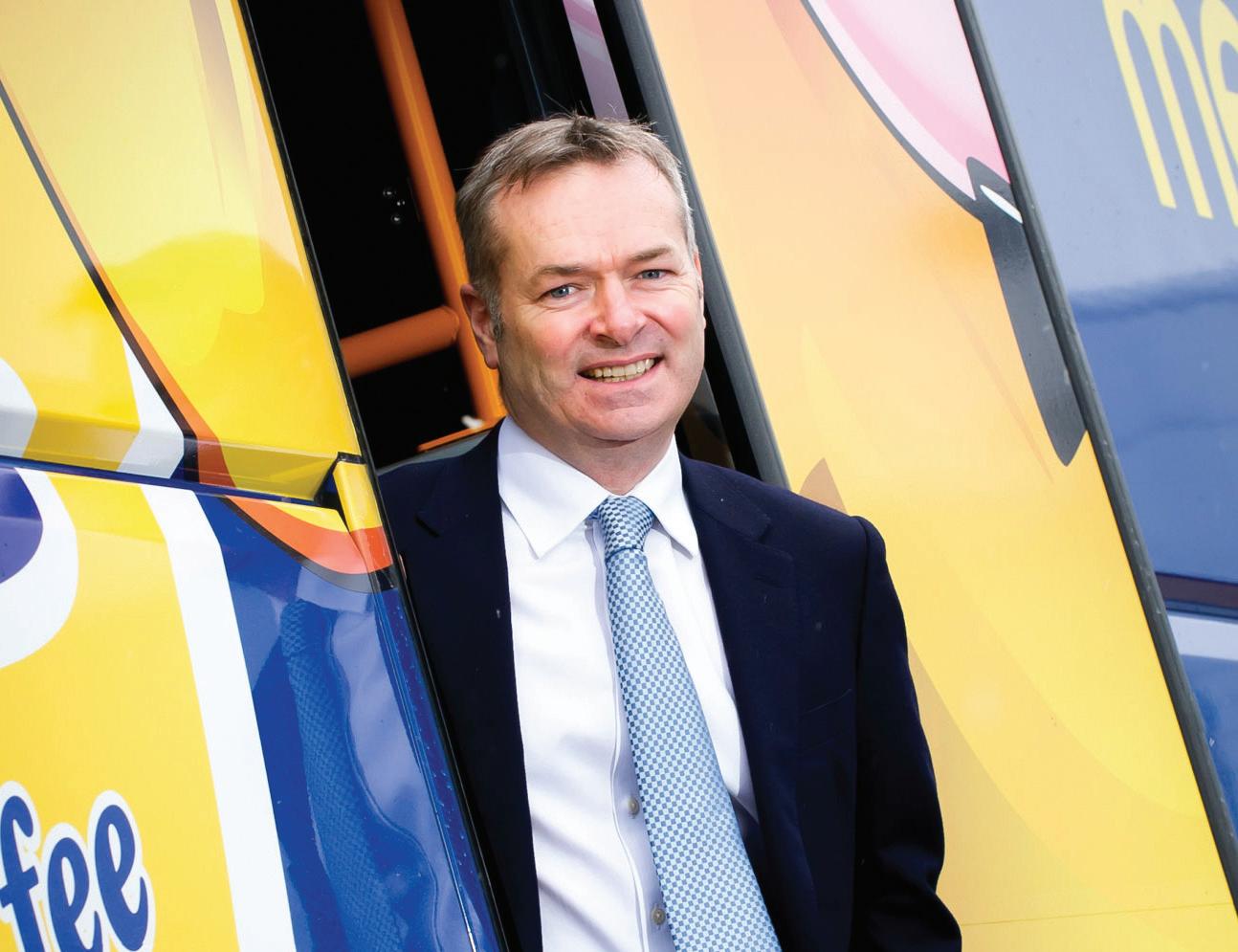
The Perth-based group said the transition to a new management team will allow the business to evolve for its next phase of growth and reflects its move from a global multi-modal business with extensive overseas interests to a group focused principally on buses and the UK.
It also follows the group rejecting a planned takeover by National Express Group (NEG), its subsequent purchase by a private equity player last year and its de-listing from the London Stock Exchange. If the NEG deal had proceeded, it was planned that both Griffiths and Paterson would leave their roles in favour
of their counterparts at NEG (PT256).
The departure of Griffiths and Paterson will see Stagecoach nonexecutive chairman Ray O’Toole take on the role of executive chairman with immediate effect.
Bruce Dingwall, currently director of finance and who has been with Stagecoach for nearly
a decade, will become chief financial officer early next month. In addition, Carla Stockton-Jones will continue to lead the day-today operations of the business.
O’Toole is no stranger to public transport in the UK. He served as chief operating officer of National Express Group until May 2010 after 10 years at the group where
he was also UK chief executive.
In November 2013 O’Toole joined Kier Group, Fleet and Passenger Services as managing director. In July 2015 he led a management buy-out team to create Essential Fleet Services, a company which provides 3,500 vehicles with contract hire and leasing to the Local Authority and Corporate markets nationally. He stepped down from Essential Fleet Services in 2017. He is also a non-executive director of Yorkshire Water.
Commenting on his departure, Griffiths said he was incredibly proud to have been part of the Stagecoach journey for over 25 years.
“After playing my part in successfully transitioning the company to its new ownership, I believe it is the right time for the business to have new leadership on the next phase of its growth,” he said.
Griffiths
“Deciding to leave a business that has been such a major part of my career and one where I have made so many friends has not been easy, but I wish my colleagues and the company every success moving forward.”
TRANSDEV
UP’ PROMOTIONS
Harrogate-based bus operator Transdev Blazefield has announced two promotions from members of staff who are part of its ‘Step Up’ training programme.
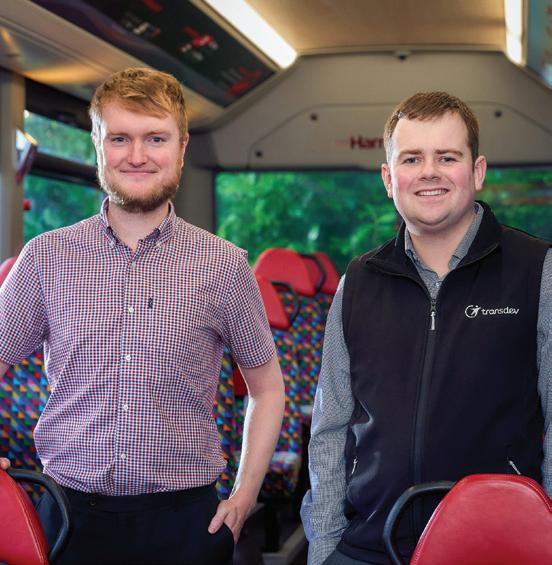
Matt Burley has been appointed as commercial manager. He joined the business as a bus driver, but he was previously a systems analyst at Heanor-based bus operator Trentbarton. Subsequent promotions saw him appointed as commercial assistant, which he said was a varied
role which helped him to build his understanding of the processes that help the company thrive in a competitive market. He was latterly ticketing and systems manager before his latest promotion.
Alex Spencer joined Transdev straight from university in 2014 as a commercial assistant. He then took on more responsibility as a scheduler before his recent promotion to the position of network manager.
“During the pandemic we faced unprecedented times with constant changes to keep our buses on the road,” Spencer said. “Using real-time data, we stayed on top of it and as a result, I know what works.”
Transdev
Alex
was please to see their progress. “Both promotions show our continuing commitment to develop the best talent within our team,” he said.
said
GO-AHEAD BOSS RECEIVES AN MBE
chief executive
Hornby
he
Two rising stars start 2023 with promotions
‘STEP
Spencer (left) and Burley
Richard Stevens, managing director of Go-Ahead subsidiary Go South West, was awarded an MBE in the New Year Honours for services to transport and to the community. He began his career as a bus driver in 1989 and has been with Go South West since being appointed as managing director of Plymouth Citybus in May 2012. Stevens is chair of the Devon & Plymouth Chamber of Commerce amongst a number of other community roles.
Richard Stevens receives a New Year Honour
CAREERS 1 | 13 January 2023 www.passengertransport.co.uk
joined Stagecoach in 1997
Leon Daniels named as CILT(UK) president
Former Transport for London MD of surface transport named as UK president for 2023 as a result of his experience and ‘exceptional record’
The Chartered Institute of Logistics and Transport in the UK has announced Leon Daniels will be its president for 2023.
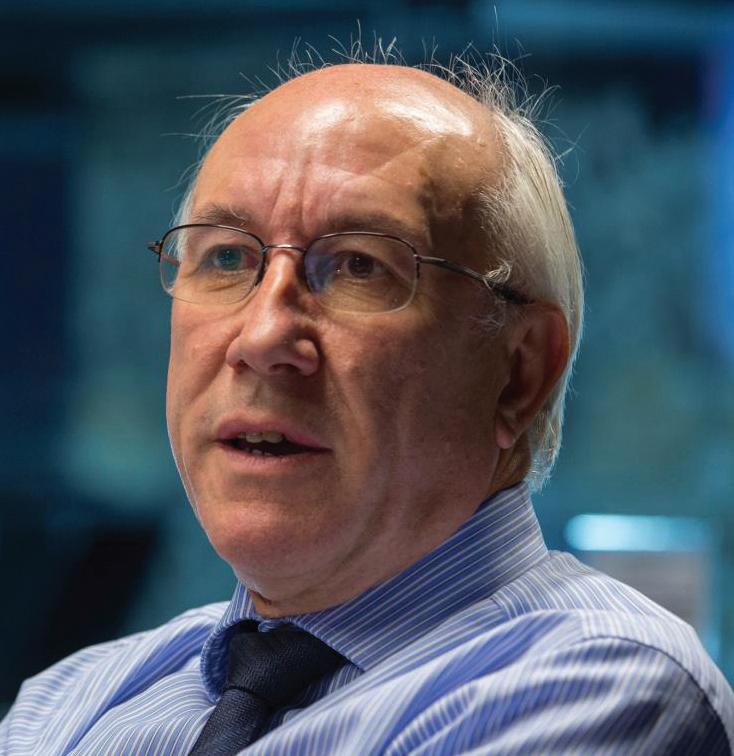
The organisation said it had appointed Daniels as a result of his experience and his exceptional record in delivery and performance at the highest level of private and public sector organisations.
Daniels was previously a vicepresident of CILT (UK) for three years and has worked in public transport in a variety of roles in the UK, Hong Kong and the
United States.
He was previously managing director of surface transport at Transport for London for a seven-year period during which he oversaw the delivery of the transport for the London 2012 Olympic Games as well as a major capital investment programme - which delivered significant improvements to the London transport system.
Retiring from TfL in 2017, Daniels now advises global governments and organisations in the fields of artificial intelligence,
public affairs and technology.
Commenting on his appointment, Daniels said: “It’s such a fantastic honour to be
named as president of CILT (UK) for 2023. As a member of CILT for nearly 30 years, I recognise the importance of an active professional community for those working in the disciplines of logistics and transport and it is a huge privilege to serve as its president.
“As a professional body, we have a responsibility to develop our profession and our members, and I look forward to working with the board of directors and vice-presidents to promote CILT and support members in their career aspirations.”
Sharon Kindleysides, CILT (UK) chief executive, said Daniels was a globally-recognised expert in the transport field. “His experience and expertise across a broad range of countries, companies and transport disciplines means the institute is set to benefit from his leadership, knowledge and skills.”
General Manager
System One Travel (Greater Manchester Travelcards Limited – GMTL) is Greater Manchester’s multi operator, multi modal transport ticketing scheme operator. GMTL is co-owned by Greater Manchester’s bus, rail and tram operators and Transport for Greater Manchester (TfGM). Current turnover is c£42m.

Te role involves working closely with the GMTL Chair, Board, shareholders, and members, coordinating, and delivering the day to day operational and business requirements. A high degree of administrative work is necessary that includes control of banking, suppliers (including legal, fnancial, and marketing) and contractors, reviewing business practice and commercial arrangements and performance.
Te role will be on a self-employed basis and requires working remotely. Attendance at meetings is mostly conducted through remote IT conference meetings but the occasional attendance at some may be necessary, normally in central Manchester. Te role averages 18 hours of working time per week, with some variability necessary when deadlines are to be met. Contract payments are negotiable but expected to be based on circa £42k per annum renewable on a six-monthly basis.
Should you be interested in the role or require a more detailed job specifcation, please contact: -
Stuart Bear, General Manager, GMTL – bears.gmtl@btinternet.com on behalf of Greater Manchester Travelcards Limited
Closing date: 13th February 2023.
CALL NOW TO ADVERTISE 020 3950 8000 or email sales@passengertransport.co.uk
To advertise, call now 020 3950 8000 or email sales@passengertransport.co.uk ADD YOUR JOBS HERE www.passengertransport.co.uk 13 January 2023 | 2
Leon Daniels
Singing bus driver is a YouTube music hit
Ranjit explains to his family about his job
A singing bus driver from the West Midlands has become a viral YouTube hit after releasing a song about his time driving buses for National Express West Midlands in the Black Country.
Ranjit Singh Veer has racked up tens of thousands of views online after penning a Punjabi song about his job. The 59-year old decided to record the song so he could adequately express to his friends and family in India about how he
spends his time at work.
together which uses NXWM’s West Bromwich depot as a backdrop.
People from the Sikh community have praised Ranjit for his song and video, with many saluting their own parents who have spent decades driving buses across the UK.
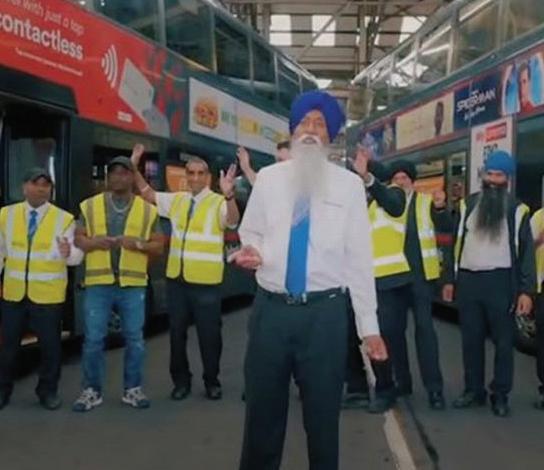
Top of the bus stops
In the song Ranjit touches on the friendships he has forged with colleagues and so it’s rather appropriate many of them feature in the music video that he put
“I have a great passion for driving and singing, so I wanted to combine the two together,” said Ranjit. “I thought there was no better way than a video to show my family back home what I do for a living.”
David Bradford, NXWM’s managing director, said his staff were his greatest assets. “Thank you to Ranjit and the team at West Bromwich for putting such a smile on everyone’s faces,” he added.
OXFORD’S LOST AND FOUND LIST
It’s the New Year and that can mean only one thing - Oxford Bus Company’s annual list of whacky lost property items hitting our inbox!
The odd sight has been reported by a railway enthusiast YouTuber who ventured out to a field to bag some footage of the abandoned carriages.
GATWICK EXPRESS IN
NEW ZEALAND
News reaches us from New Zealand where it appears some old Gatwick Express carriages are enjoying a quiet retirement in a field near Palmerston North.
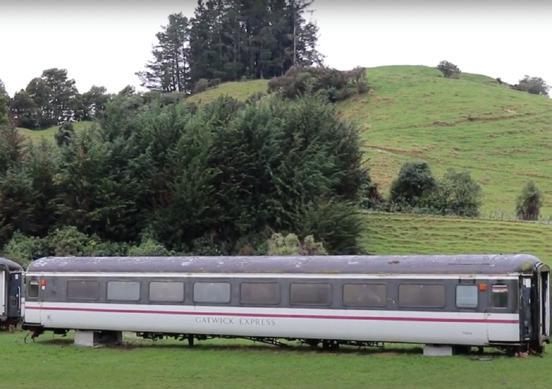
Of course New Zealand is no stranger to old British rolling stock. Mark 2 carriages like these Gatwick Express coaches are used by a number of Kiwi rail passenger operators, including some coaches which have had major surgery to equip them with wide sliding doors for use on commuter services into Auckland.
However, these two coaches
were amongst a batch bought by Mainline Steam Heritage Trust in around 2007 after the troubled Class 460 ‘Juniper’ Electric Multiple Units replaced them on Gatwick Express services.
This year’s list of bizarre lost property is as baffling as evera Mary Poppins flamingo umbrella, Voldemort’s wand (Ed: the real one?), a trombone and a witch’s broom.
Icat dolute storem volup
While most have been subjected to major refurbishment for use on Mainline’s heritage rail tours using a fleet of smart steam locomotives, for some reason these two carriages were left in the field. And so today they remain in the same condition they were in after they came off the boat from the UK!
Still 2022’s haul is not as good as previous years when the list has included such highlights as a light saber, a fireman’s helmet, a Soviet Union hat, a letter detailing sexual fantasies (*cough*), a Donald Trump toilet roll and Ann Summers lingerie...

SEEN SOMETHING QUIRKY?
Why not drop us a line at editorial@passengertransport.co.uk
SUBSCRIPTION ORDER FORM All annual subscription rates include delivery by secondclass post, or airmail for overseas. Please note: At present we are unable to provide printed subscriptions to readers based in European Union member countries. ANNUA L SUBSCRIPTION R ATES 1 year UK: £140 Rest of World: £280 2 year UK: £250 3 year UK: £375 WWW.PASSENGERTRANSPORT.CO.UK N A M E JOB TITLE CO M PANY ADDRESS POSTCODE TEL E M AIL DATE PLEASE START MY SUBSCRIPTION TO PASSENGER TRANSPORT CARD NU M BER SECURITY CODE EXPIRY DATE SIGNATURE I enclose a cheque for £ made payable to Passenger Transport Publishing Limited Please invoice my company (official order enclosed) I authorise you to debit my M astercard/VISA/ M aestro/VISA Electron card. Amount £ PT280 Email: subs@passengertransport.co.uk Return to: Subscriptions, Passenger Transport Publishing Ltd, PO Box 5496, Westbury BA13 9BX
Sharon Palfreeman from OBC models some of last year’s lost property haul
‘Is this Clapham Junction?’
DIVERSIONS 28 | 13 January 2023 www.passengertransport.co.uk

















 Rishi Sunak boards an RAF plane as he heads to visit a healthcare centre in Leeds
Rishi Sunak boards an RAF plane as he heads to visit a healthcare centre in Leeds


















